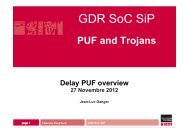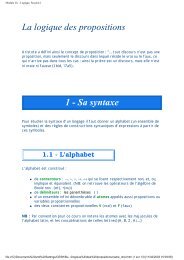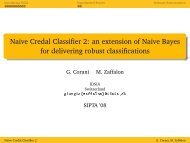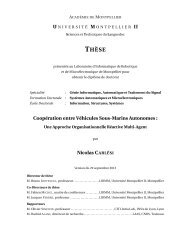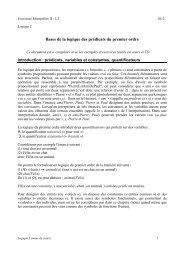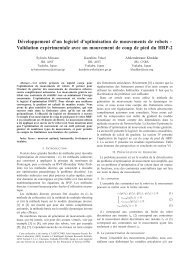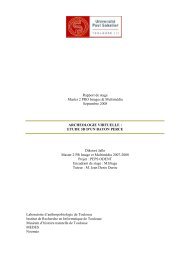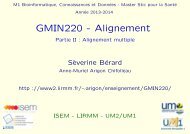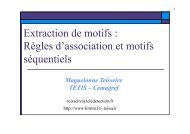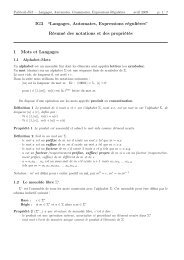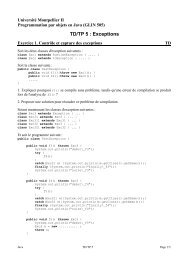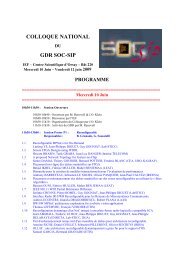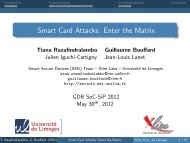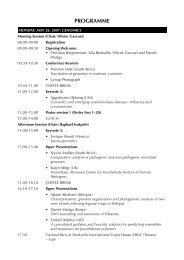ECAI 2012 Program - Lirmm
ECAI 2012 Program - Lirmm
ECAI 2012 Program - Lirmm
You also want an ePaper? Increase the reach of your titles
YUMPU automatically turns print PDFs into web optimized ePapers that Google loves.
20 th EUROPEAN CONFERENCE ON ARTIFICIAL INTELLIGENCE<br />
MONTPELLIER, FRANCE<br />
AUGUST 27-31, <strong>2012</strong><br />
<strong>ECAI</strong><strong>2012</strong><br />
<strong>Program</strong><br />
1
Table of Contents<br />
Welcome to <strong>ECAI</strong> <strong>2012</strong><br />
Keynote Speakers<br />
Invited Tutorial Speakers<br />
<strong>Program</strong> at a Glance<br />
<strong>ECAI</strong> Workshop & Tutorial <strong>Program</strong><br />
STAIRS <strong>Program</strong><br />
<strong>ECAI</strong> Main Conference <strong>Program</strong><br />
Social Events<br />
Useful Information<br />
Maps<br />
Co-located Symposium: RuleML <strong>2012</strong> - <strong>Program</strong><br />
Conference Organization<br />
Sponsorship & Support<br />
5<br />
7<br />
10<br />
16<br />
18<br />
21<br />
23<br />
33<br />
35<br />
37<br />
42<br />
44<br />
45<br />
3
Welcome to <strong>ECAI</strong> <strong>2012</strong><br />
Welcome to <strong>ECAI</strong> <strong>2012</strong> in the beautiful city of Montpellier. This<br />
year again, researchers and practitioners of Artificial Intelligence<br />
gather and discuss the latest trends and challenges on AI’s theory<br />
and technology. The attached program is composed of 140 presentations<br />
and 23 posters selected out of 563 papers, with an<br />
open-minded and interdisciplinary perspective.<br />
As in past editions, <strong>ECAI</strong> <strong>2012</strong> features the STarting AI Researcher<br />
Symposium (STAIRS) and the Conference on Prestigious Applications<br />
of Intelligent Systems (PAIS) as sub-conferences. It again<br />
includes a special session with System Demonstrations and posters.<br />
This year, IBM has kindly offered to join and demonstrate its<br />
recent WATSON question-answering system.<br />
This is a historical <strong>ECAI</strong> as we celebrate several anniversaries:<br />
the Turing centennial, the 20th <strong>ECAI</strong> conference and 25 years of<br />
existence of AI Communications (the ECCAI journal). These celebrations<br />
take the form of a special track where a number of distinguished<br />
speakers will provide a historical perspective on the<br />
field of Artificial Intelligence in Europe and beyond. In addition,<br />
<strong>ECAI</strong> <strong>2012</strong> features 4 keynote speakers, Wolfram Burgard, Adnan<br />
Darwiche, Tom Mitchell and Michael Wooldridge. We also wish to<br />
stress the novel Frontiers of Artificial Intelligence track, in which<br />
6 invited speakers will deliver perspective talks on particularly<br />
interesting new research directions in Artificial Intelligence or one<br />
of its neighbouring fields. Last but not least, there is a very large<br />
choice of small workshops, where subcommunities of AI can gather<br />
and freely discuss specialized topics prior to attending the<br />
main conference, and some satellite events such as RuleML.<br />
Overall we trust <strong>ECAI</strong> <strong>2012</strong> will be an exciting and thought-provoking<br />
conference in the very pleasant environment offered by the<br />
city of Montpellier.<br />
Didier Dubois, Luc De Raedt and Christian Bessiere<br />
5
Keynote Speakers<br />
Wolfram Burgard<br />
University of Freiburg,<br />
Germany<br />
Probabilistic<br />
Techniques for<br />
Mobile Robot<br />
Navigation<br />
Tuesday, 18:00<br />
Probabilistic approaches have been discovered<br />
as one of the most powerful approaches<br />
to highly relevant problems in<br />
mobile robotics including perception and<br />
robot state estimation. Major challenges in<br />
the context of probabilistic algorithms for<br />
mobile robot navigation lie in the questions<br />
of how to deal with highly complex state<br />
estimation problems and how to control<br />
the robot so that it efficiently carries out<br />
its task. In this talk, I will present recently<br />
developed techniques for efficiently learning<br />
a map of an unknown environment<br />
with a mobile robot. I will also describe<br />
how this state estimation problem can be<br />
solved more effectively by actively controlling<br />
the robot. For all algorithms I will present<br />
experimental results that have been<br />
obtained with mobile robots in real-world<br />
environments.<br />
Short bio<br />
Wolfram Burgard is a professor for computer<br />
science at the University of Freiburg,<br />
Germany where he heads the Laboratory<br />
for Autonomous Intelligent Systems. He<br />
studied Computer Science at the University<br />
of Dortmund and received his Ph.D. degree<br />
in computer science from the University<br />
of Bonn in 1991. His areas of interest lie<br />
in artificial intelligence and mobile robots.<br />
In the past, Wolfram Burgard and his<br />
group developed several innovative probabilistic<br />
techniques for robot navigation<br />
and control. They cover different aspects<br />
including localization, map-building, path<br />
planning, and exploration. He received<br />
the prestigious Gottfried Wilhelm Leibniz-<br />
Preis in 2009 and an advanced ERC grant in<br />
2010. He is an AAAI and ECCAI fellow.<br />
Adnan Darwiche<br />
UCLA, United States<br />
Generalized Decision Diagrams:<br />
The game is not over yet!<br />
Wednesday, 9:00<br />
Decision diagrams<br />
have played an influential<br />
role in computer<br />
science and AI<br />
over the past few decades, with OBDDs<br />
(Ordered Binary Decision Diagrams) as<br />
perhaps the most practical and influential<br />
example. The practical influence of OBDDs<br />
is typically attributed to their canonicity,<br />
their efficient support of Boolean combination<br />
operations, and the availability of<br />
effective heuristics for finding good variable<br />
orders (which characterize OBDDs<br />
and their size). Over the past few decades,<br />
significant efforts have been exerted to generalize<br />
OBDDs, with the goal of defining<br />
more succinct representations while retaining<br />
the attractive properties of OBDDs.<br />
On the theoretical side, these efforts have<br />
yielded a rich set of decision diagram generalizations.<br />
Practically, however, OBDDs<br />
remain as the single most used decision<br />
diagram in applications. In this talk, I will<br />
discuss a recent line of research for generalizing<br />
OBDDs based on a new type of<br />
Boolean-function decompositions (which<br />
generalize the Shannon decomposition<br />
underlying OBDDs).<br />
7
I will discuss in particular the class of Sentential<br />
Decision Diagrams (SDDs), which<br />
branch on arbitrary sentences instead of<br />
variables, and which are characterized<br />
by trees instead of total variable orders.<br />
SDDs retain the main attractive properties<br />
of OBDDs and include OBDDs as a special<br />
case. I will discuss recent theoretical<br />
and empirical results, and a soon-to-bereleased<br />
open source package for supporting<br />
SDDs, which suggest a potential<br />
breakthrough in the quest for producing<br />
more practical generalizations of OBDDs.<br />
Short bio<br />
Adnan Darwiche is a Professor and former<br />
Chairman of the Computer Science<br />
Department at UCLA. He obtained his<br />
Ph.D. degree in Computer Science from<br />
Stanford University in 1993. Professor<br />
Darwiche currently directs the automated<br />
reasoning group at UCLA which focuses<br />
on the theory and practice of probabilistic<br />
and logical reasoning, and is credited for<br />
publicly releasing a number of award-winning<br />
reasoning systems (http://reasoning.<br />
cs.ucla.edu/). Professor Darwiche is a former<br />
Editor-in-Chief of the Journal of Artificial<br />
Intelligence Research (JAIR). He is also<br />
an AAAI fellow, and author of the textbook,<br />
«Modeling and Reasoning with Bayesian<br />
Networks,» published by Cambridge Uni-<br />
Tom Mitchell<br />
CMU, United States<br />
Never Ending Learning<br />
Thursday, 9:00<br />
We will never really<br />
understand learning<br />
or intelligence<br />
until we can build<br />
machines that learn<br />
many different things,<br />
over years, and become better learners<br />
over time. This talk describes our research<br />
to build a Never-Ending Language Learner<br />
(NELL) that runs 24 hours per day, forever,<br />
learning to read the web. Each day NELL<br />
8<br />
extracts (reads) more facts from the web,<br />
and integrates these into its growing knowledge<br />
base of beliefs. Each day NELL also<br />
learns to read better than yesterday, enabling<br />
it to go back to the text it read yesterday,<br />
and extract more facts, more accurately.<br />
NELL has been running 24 hours/day<br />
for over two years now. The result so far<br />
is a collection of 15 million interconnected<br />
beliefs (e.g., servedWtih(coffee, applePie),<br />
isA(applePie, bakedGood)), that NELL is<br />
considering at different levels of confidence,<br />
along with hundreds of thousands<br />
of learned phrasings, morphological features,<br />
and web page structures that NELL<br />
uses to extract beliefs from the web. Track<br />
NELL’s progress at http://rtw.ml.cmu.edu.<br />
Short bio<br />
Tom M. Mitchell founded and chairs the<br />
Machine Learning Department at Carnegie<br />
Mellon University, where he is the E. Fredkin<br />
University Professor. His research uses<br />
machine learning to develop computers<br />
that are learning to read the web, and uses<br />
brain imaging to study how the human<br />
brain understands what it reads. Mitchell is<br />
a member of the U.S. National Academy of<br />
Engineering, a Fellow of the American Association<br />
for the Advancement of Science<br />
(AAAS), and a Fellow of the Association for<br />
the Advancement of Artificial Intelligence<br />
(AAAI). He believes the field of machine<br />
learning will be the fastest growing branch<br />
of computer science during the 21st century.
Michael Wooldridge<br />
University of Liverpool, UK<br />
Bad Equilibria, and What to<br />
do About Them<br />
Friday, 9:00<br />
In economics, an<br />
equilibrium is a<br />
steady-state situation,<br />
which is obtained<br />
because no participant has<br />
any rational incentive to deviate from it.<br />
Equilibrium concepts are arguably the<br />
most important and widely used analytical<br />
weapons in the game theory arsenal. The<br />
concept of Nash equilibrium in particular<br />
has found a huge range of applications, in<br />
areas as diverse and seemingly unrelated<br />
as biology and moral philosophy. However,<br />
there remain fundamental problems<br />
associated with Nash equilibria and their<br />
application. First, there may be multiple<br />
Nash equilibria, in which case, how should<br />
we choose between them? Second, some<br />
equilibria may be undesirable, in which<br />
case, how can we avoid them? In this<br />
presentation, I will introduce work that<br />
we have done addressing these problems<br />
from a computational/AI perspective.<br />
Assuming no prior knowledge of game<br />
theory or economic solution concepts, I<br />
will discuss various ways in which we can<br />
try to engineer a scenario so that desirable<br />
equilibria result, or else engineer out undesirable<br />
equilibria.<br />
Short bio<br />
Michael Wooldridge is a Professor of Computer<br />
Science in the Department of Computer<br />
Science at the University of Oxford,<br />
and a Senior Research Fellow at Hertford<br />
College. He joined Oxford on 1 June <strong>2012</strong>;<br />
before this he was for twelve years a Professor<br />
of Computer Science at the University<br />
of Liverpool. In October 2011, he was<br />
awarded a 5-year ERC Advanced Grant,<br />
entitled «Reasoning About Computational<br />
Economies» (RACE).<br />
He is an AAAI Fellow, an ECCAI Fellow, an<br />
AISB Fellow, and a BCS Fellow. In 2006, he<br />
was the recipient of the ACM Autonomous<br />
Agents Research Award. In 1997, he founded<br />
AgentLink, the EC-funded European<br />
Network of Excellence in the area of agentbased<br />
computing. He was program chair<br />
for <strong>ECAI</strong> 2010, held in Lisbon, Portugal, in<br />
August 2010. He will be General Chair for<br />
the 24th International Joint Conference on<br />
Artificial Intelligence (IJCAI-2015), to be<br />
held in Buenos Aires, Argentina. Between<br />
2003 and 2009, he was co-editor-in-chief<br />
of the Autonomous Agents and Multi-<br />
Agent Systems Journal. He is an associate<br />
editor of the Journal of Artificial Intelligence<br />
Research (JAIR) (2006-2009, 2009-<br />
<strong>2012</strong>), an associate editor of Artificial Intelligence<br />
journal (2009-<strong>2012</strong>) and serves<br />
on the editorial boards of the Journal of<br />
Applied Logic, Journal of Logic and Computation,<br />
Journal of Applied Artificial Intelligence,<br />
and Computational Intelligence.<br />
9
Invited Tutorial Speakers<br />
Michael Beetz<br />
University of Bremen<br />
Knowledge processing and reasoning<br />
for robotic agents performing everyday<br />
manipulation<br />
The tutorial will describe knowledge processing<br />
and reasoning methods that are<br />
embodied into an autonomous robot in order<br />
to perform everyday manipulation actions<br />
such as cleaning up, preparing meals,<br />
and setting a table more competently. The<br />
tutorial will cover:<br />
▪ requirements for robot knowledge processing<br />
and reasoning,<br />
▪ semantic robot description language,<br />
▪ reasoning with the execution time data<br />
structures of control systems,<br />
▪ issues in translating web instructions<br />
into robot action plans,<br />
▪ integrating knowledge processing and<br />
perception,<br />
▪ representing and acquiring semantic,<br />
object-based environment maps,<br />
▪ prediction-based action parameterization,<br />
▪ simulation-based plan projection, and<br />
▪ probabilistic reasoning mechanisms.<br />
The tutorial is accompanied with various<br />
opensource software tools that can be<br />
obtained from ias.cs.tum.edu/research/<br />
knowledge (KnowRob), ias.cs.tum.edu/<br />
research/cram (CRAM plan language), and<br />
ias.cs.tum.edu/research/probcog (PROB-<br />
COG) including download instructions and<br />
tutorials.<br />
Short bio<br />
Michael Beetz holds the chair on Artificial<br />
Intelligence in the Department of Mathematics<br />
and Computer Science at the University<br />
of Bremen and heads the research<br />
group «Intelligent Autonomous Systems».<br />
From 2004 to <strong>2012</strong> he has been professor<br />
for computer science at the Department<br />
10<br />
of Informatics of Technische Universität<br />
München and headed the Intelligent Autonomous<br />
Systems group. He has been the<br />
vice coordinator of the German cluster of<br />
excellence CoTeSys (Cognition for Technical<br />
Systems) from 2007-2011 and is coordinator<br />
of the EU FP7 integrating project<br />
ROBOHOW. Michael Beetz was a member<br />
of the steering committee of the European<br />
network of excellence in AI planning (PLA-<br />
NET) and coordinated the research area<br />
robot planning. He is associate editor of<br />
the Artificial Intelligence journal. He is also<br />
principal investigator of a number of national<br />
and European research projects in the<br />
area of AI-based robot control.<br />
Michael Beetz received his diploma degree<br />
in Informatics with distinction from the<br />
University of Kaiserslautern. He received<br />
his MSc, MPhil and PhD degrees from Yale<br />
University in 1993, 1994 and 1996 and his<br />
Venia Legendi from the University of Bonn<br />
in 2000. His research interests include integrated<br />
cognition-enabled robotic systems,<br />
plan-based control of autonomous robots,<br />
knowledge representation and processing<br />
for robots, integrated robot learning and<br />
cognitive perception.<br />
Peter Flach<br />
University of Bristol<br />
Unity in diversity: the breadth and depth<br />
of Machine Learning explained for AI<br />
researchers<br />
Machine learning is one of the most active<br />
areas in artificial intelligence, but the diversity<br />
of the field can be intimidating for<br />
newcomers. The aim of this tutorial is to<br />
do justice to the field’s incredible richness<br />
without losing sight of its unifying principles.<br />
I will discuss three main families of<br />
machine learning models: logical, geometric,<br />
and probabilistic. Unity is achieved by
concentrating on the central role of tasks<br />
and features. An innovative use of ROC<br />
plots provides further insights into the<br />
behaviour and performance of machine<br />
learning algorithms.<br />
Short bio<br />
Professor Flach publishes widely and on<br />
a broad range of subjects. He is an internationally<br />
leading researcher in the areas<br />
of mining highly structured data and the<br />
evaluation and improvement of machine<br />
learning models using ROC analysis. He has<br />
also published on the logic and philosophy<br />
of machine learning, and on the combination<br />
of logic and probability. He is author<br />
of Simply Logical: Intelligent Reasoning by<br />
Example (John Wiley, 1994) and Machine<br />
Learning: the Art and Science of Algorithms<br />
that Make Sense of Data (Cambridge University<br />
Press, <strong>2012</strong>). Prof. Flach is currently<br />
the Editor-in-Chief of the Machine Learning<br />
journal, one of the two top journals<br />
in the field that has been published for<br />
25 years by Kluwer and now Springer. He<br />
was <strong>Program</strong> Co-Chair of the 1999 International<br />
Conference on Inductive Logic <strong>Program</strong>ming,<br />
the 2001 European Conference<br />
on Machine Learning, and the 2009 ACM<br />
Conference on Knowledge Discovery and<br />
Data Mining. In <strong>2012</strong> he will co-chair the<br />
European Conference on Machine Learning<br />
and Principles and Practice of Knowledge<br />
Discovery in Databases in Bristol.<br />
Christophe Lecoutre<br />
Olivier Roussel<br />
University of Artois<br />
Constraint Reasoning<br />
At the heart of constraint reasoning, inference<br />
methods play a central role, by typically<br />
reducing the size of the search space<br />
through filtering algorithms. In this tutorial,<br />
besides some fundamental recalls about<br />
modelling and search, we shall overview<br />
the most successful inference algorithms,<br />
for a wide range of constraint frameworks.<br />
For CSP (Constraint Satisfaction Problem),<br />
we shall present general-purpose algorithms<br />
for enforcing the property known<br />
as GAC (Generalized Arc Consistency), as<br />
well as specific GAC algorithms for table<br />
constraints and some global constraints.<br />
For WCSP (Weighted Constraint Satisfaction<br />
problem), we shall introduce the basic<br />
and more recent approaches based on cost<br />
transfer. For SAT (Satisfiability problem),<br />
we shall recall the usual Unit Propagation<br />
and the inference techniques that are used<br />
to improve its power. We shall focus on the<br />
link with GAC on CSP. For pseudo-Boolean<br />
constraints, we shall present the cutting<br />
plane inference system and establish links<br />
with SAT and the other consistency algorithms.<br />
Short bio<br />
Christophe Lecoutre is a professor of Computer<br />
Science at the University of Artois,<br />
France, and member of the research laboratory<br />
CRIL (Centre de Recherche en Informatique<br />
de Lens, France). He is the author<br />
of Constraint Networks, a book published<br />
by Wiley in 2009, and is co-author of more<br />
than 50 research papers. His research<br />
centers on constraint programing, with a<br />
focus on generic algorithms for CSP and<br />
WCSP. Olivier Roussel is associate professor<br />
of Computer Science at the University<br />
of Artois, France. His research interests are<br />
focused on satisfiability in a broad sense,<br />
including SAT, pseudo-Booleans, CSP, and<br />
WCSP. He has organized several editions of<br />
various solver competitions (SAT, pseudo-<br />
Booleans, CSP).<br />
Olivier Roussel is associate professor of<br />
Computer Science at the University of<br />
Artois, France. He received his doctoral<br />
degree in computer science in 1997 from<br />
University of Lille, France. His research<br />
interests are focused on satisfiability in a<br />
broad sense, including SAT, pseudo-Booleans,<br />
CSP, and WCSP. He has organized<br />
several editions of various solver competitions<br />
(SAT, pseudo-Booleans, CSP).<br />
11
Eyke Hüllermeier<br />
Universiy of Marburg<br />
Johannes Fuernkranz<br />
TU Darmstadt<br />
Preference Learning<br />
The primary goal of this tutorial is to survey<br />
the field of preference learning in its current<br />
stage of development. The presentation<br />
will focus on a systematic overview of<br />
different types of preference learning problems,<br />
methods and algorithms to tackle<br />
these problems, and metrics for evaluating<br />
the performance of preference models<br />
induced from data. More details can be<br />
found at http://www.ke.tu-darmstadt.de/<br />
events/PL-12/tutorial.html<br />
Short bio<br />
Eyke Hüllermeier was born in 1969. He<br />
holds MSc degrees in mathematics and<br />
business informatics, both from the University<br />
of Paderborn (Germany). From<br />
the Computer Science Department of the<br />
same university he obtained his PhD in<br />
1997 and a Habilitation degree in 2002.<br />
He worked as a researcher and teaching<br />
assistant in the fields of computer science<br />
(artificial intelligence, knowledge-based<br />
systems) and statistics at the University<br />
of Paderborn and the University of Dortmund.<br />
From 1998 to 2000, he spent two<br />
years as a Marie Curie fellow at the IRIT --<br />
Institut de Recherche en Informatique de<br />
Toulouse. Prior to joining the Department<br />
of Mathematics and Computer Science at<br />
Marburg University as a full professor, he<br />
held a position as an associate professor<br />
in the Faculty of Computer Science at the<br />
Otto-von-Guericke-Universität Magdeburg<br />
(2004-2006) and as a Junior professor in<br />
Marburg (2002-2004).<br />
Johannes Fürnkranz is a Professor for<br />
Knowledge Engineering at TU Darmstadt.<br />
He obtained Master Degrees from TU Wien<br />
and the University of Chicago, and a Ph.D.<br />
from the TU Wien with a Thesis on «Pruning<br />
Algorithms for Rule Learning». His<br />
main research interest is machine learning,<br />
12<br />
in particular inductive rule learning and<br />
preference learning, and their applications<br />
in game playing, web mining, and data<br />
mining in the Social Sciences. He is action<br />
editor for «Machine Learning» and «Data<br />
Mining and Knowledge Discovery», current<br />
or past Editorial Board Member of several<br />
other renown journals, and a regular Senior<br />
PC member of premier conferences in<br />
these areas. In 2006, he co-chaired the 6th<br />
European Conference on Machine Learning<br />
and Principles and Practice of Knowledge<br />
Discovery in Databases in Berlin, and in<br />
2010 he served as program co-chair of the<br />
27th International Conference on Machine<br />
Learning in Haifa, Israel.<br />
Andreas Krause<br />
ETH Zurich<br />
Stefanie Jegelka<br />
UC Berkeley<br />
Submodularity in Artificial Intelligence<br />
Many problems in AI are inherently discrete.<br />
Often, the resulting discrete optimization<br />
problems are computationally<br />
extremely challenging. While convexity is<br />
an important property when solving continuous<br />
optimization problems, submodularity,<br />
also viewed as a discrete analog of<br />
convexity, is closely tied to the tractability<br />
of many problems: its structure is key to<br />
solving many discrete optimization problems.<br />
Even more, the characterizing property<br />
of submodular functions, diminishing<br />
marginal returns, emerges naturally in various<br />
settings and is a rich abstraction for a<br />
myriad of problems. Long recognized for its<br />
importance in combinatorial optimization<br />
and game theory, submodularity is now appearing<br />
in an increasing number of applications<br />
in AI, in particular in machine learning<br />
and computer vision. These include probabilistic<br />
inference, structure learning, sparse<br />
representation and reconstruction, unspervised<br />
and active learning, optimized<br />
information gathering, summarization and<br />
influence maximization. Recent work ex-
tends submodular optimization to sequential<br />
decision making under uncertainty, and<br />
addresses learning of submodular functions,<br />
combinatorial problems with submodular<br />
loss functions and more efficient<br />
optimization algorithms. The wide range<br />
of applications and of theoretical questions<br />
make submodularity a relevant and<br />
interesting topic to many researchers in<br />
AI. This tutorial introduces AI researchers<br />
to the concept of submodular functions,<br />
their optimization, applications and recent<br />
research directions. Illustrative examples<br />
and animations will help develop an intuition<br />
for the concept and algorithms. The<br />
tutorial aims at providing an overview of<br />
existing results that are important to AI<br />
researchers, discuss AI applications with an<br />
emphasis on machine learning and computer<br />
vision, and will provide pointers to<br />
further, detailed resources. Sample older<br />
slides are available at submodularity.org.<br />
The tutorial will also cover new results and<br />
directions from the past five years. The<br />
tutorial will be divided into four sections:<br />
1. What is submodularity and what is special<br />
about it? Is my problem submodular?<br />
2. What are example applications of submodular<br />
maximization and minimization?<br />
3. What algorithms exist for optimizing<br />
submodular functions?<br />
4. What are new directions?<br />
Short bio<br />
Both authors have considerable expertise<br />
in the area. Andreas Krause, assistant<br />
professor at ETH Zurich, has investigated<br />
several aspects of submodularity in machine<br />
learning, with a particular emphasis<br />
on optimized information gathering and<br />
active learning. His work in this area has<br />
won awards at several conferences (KDD,<br />
ICML, UAI, AAAI, IPSN). He has previously<br />
held tutorials at ICML, IJCAI and LION. Stefanie<br />
Jegelka is a postdoctoral researcher<br />
at UC Berkeley. Her Ph.D. thesis introduces<br />
submodular costs into combinatorial minimization<br />
problems in machine learning<br />
and computer vision, and addresses practical<br />
algorithms and online learning with<br />
submodular functions. The authors have<br />
also organized a series of workshops on<br />
Discrete Optimization in Machine Learning<br />
(DISCML) at the annual NIPS conference.<br />
Leon Van Der Torre<br />
University of Luxembourg<br />
Logics for multi-agent systems<br />
A variety of logics is used to reason about<br />
multiagent systems. For example, temporal<br />
logic has been imported from computer<br />
science, in particular ATL to reason about<br />
the powers of agents, and extended with<br />
modalities for cognitive attitudes. More<br />
recently logics for agent interaction have<br />
become popular, such as argumentation<br />
theory for dialogues, and deontic logic for<br />
coordination. In this tutorial we give an<br />
overview of logics used in multiagent systems,<br />
and discuss their combination and<br />
interaction. We illustrate the combination<br />
of multiagent logics with an example from<br />
agreement technologies.<br />
Short bio<br />
Leon van der Torre developed the BOID<br />
agent architecture (with colleagues from<br />
Vrije Universiteit), input/output logic (with<br />
David Makinson) and the game-theoretic<br />
approach to normative multiagent systems<br />
(with Guido Boella from University of<br />
Turin). He is an editor of the Handbook of<br />
Deontic Logic and Normative Systems (in<br />
preparation), corner editor of the Journal<br />
of Logic and Computation, and member of<br />
editorial board of Logic Journal of the IGPL.<br />
In January 2006 he joined the University<br />
of Luxembourg as a full professor for Intelligent<br />
Systems, and on May 2nd, 2007, he<br />
delivered his inaugural speech «Violation<br />
games: a new approach of handling norms<br />
in intelligent systems.’’ He is driven by the<br />
insight that intelligent systems (like humans)<br />
are characterized not only by their<br />
individual reasoning capacity, but also by<br />
their social interaction potential. His ove-<br />
13
arching goal is to develop and investigate<br />
comprehensive formal models and computational<br />
realizations of individual and<br />
collective reasoning and rationality. His<br />
current research interests are normative<br />
multi-agent systems, autonomous cognitive<br />
agents, computational social choice,<br />
and the foundations of logic-based knowledge<br />
representation and reasoning.<br />
Francesca Rossi<br />
University of Padova, Italy<br />
Kristen Brent Venable<br />
Tulane University and IHMC<br />
Toby Walsh<br />
NICTA Australia and University of New<br />
South Wales<br />
Preference reasoning and aggregation<br />
Preferences are ubiquitous in everyday<br />
decision making. They are therefore an<br />
essential ingredient of many reasoning<br />
tools. This tutorial will start by presenting<br />
the main approaches to model and reason<br />
with preferences, such as soft constraints<br />
and CP-nets. We will also consider issues<br />
such as preference elicitation and various<br />
forms of uncertainty given by missing, imprecise,<br />
or vague preferences. We will then<br />
consider multi-agent settings, where several<br />
agents express their preferences over<br />
common objects and the system should<br />
aggregate such preferences into a single<br />
satisfying decision. In this setting, we will<br />
exploit notions and results from different<br />
fields, such as social choice, matching, and<br />
multi-criteria decision making. Intended<br />
audience: The tutorial is meant for students<br />
as well as for researchers which may<br />
be interested in an introduction to preference<br />
modeling and reasoning. The target<br />
also includes researchers from several AI<br />
fields interested in understanding the applications<br />
of preferences to their area. No<br />
specific prerequisite knowledge is essential.<br />
Some general knowledge of AI and computational<br />
complexity is advisable.<br />
14<br />
Short bio<br />
Francesca Rossi is a full professor of Computer<br />
Science at the University of Padova,<br />
Italy. She works on constraint programing,<br />
preference reasoning, and multi-agent<br />
preference aggregation. She has published<br />
over 170 papers on these topics and she<br />
has edited 16 volumes between collections<br />
of articles and special issues. She has been<br />
conference chair of CP 1998, program chair<br />
of CP 2003, and conference organizer of<br />
ADT 2009. She will be program chair of IJCAI<br />
2013. She is a co-editor of the Handbook of<br />
Constraint <strong>Program</strong>ming, with Peter Van<br />
Beek and Toby Walsh, published by Elsevier<br />
in 2006. She has been the president of the<br />
Association for Constraint <strong>Program</strong>ming<br />
from 2003 to 2007. She is a member of the<br />
advisory board of JAIR (where she has been<br />
associate editor in 2005-2007) and of the<br />
editorial board of Constraints and of the AI<br />
Journal, an associate editor of AMAI, and a<br />
column editor for the Journal of Logic and<br />
Computation. She is an ECCAI fellow.<br />
Kristen Brent Venable is associate professor<br />
in the Department of Computer Science<br />
of Tulane University and research scientist<br />
at IHMC, the Florida Institute of Human<br />
and Machine Cognition. In the past she<br />
has been assistant professor in the Dept. of<br />
Pure and Applied Mathematics at the University<br />
of Padova (Italy). Her main research<br />
interests are within artificial intelligence<br />
and regard, in particular, compact preference<br />
representation formalisms, computational<br />
social choice, temporal reasoning<br />
and, in general, constraint-based optimization.<br />
Her list of publications includes<br />
more than 70 papers including journals<br />
and proceedings of the main international<br />
conferences on the topics relevant to her<br />
interests. She is involved in a lively international<br />
scientific exchange and, among<br />
others, she collaborates with researchers<br />
from NASA Ames, SRI International, NICTA-<br />
UNSW (Australia),University of Amsterdam<br />
(The Netherlands), 4C (Ireland) and Ben-<br />
Gurion University (Israel).
Toby Walsh is Research Group Leader at<br />
NICTA. He is adjunct Professor at the Department<br />
of Computer Science and Engineering<br />
at the University of New South Wales,<br />
external Professor of the Department<br />
of Information Science at Uppsala University<br />
and an honorary fellow of the School<br />
of Informatics at Edinburgh University. He<br />
is Editor-in-Chief of the Journal of Artificial<br />
Intelligence Research, and was previously<br />
Editor-in-Chief of AI Communications. He<br />
is on the editorial board of the Journal of<br />
Automated Reasoning and the Constraints<br />
journal. He has been elected a fellow of<br />
both the Association for the Advancement<br />
of Artificial Intelligence and the European<br />
Coordinating Committee for AI in recognition<br />
of his research and service to the community.<br />
He has been Secretary of the Association<br />
for Constraint <strong>Program</strong>ming (ACP)<br />
and is Editor of CP News, the newsletter<br />
of the ACP. He is one of the Editors of the<br />
Handbook for Constraint <strong>Program</strong>ming,<br />
and the Handbook for Satisfiability. He<br />
was <strong>Program</strong> Chair of the Constraint <strong>Program</strong>ming<br />
Conference in 2001, Conference<br />
Chair of the International Joint Conference<br />
on Automated Reasoning in 2004, <strong>Program</strong><br />
and Conference Chair of the Satisfiability<br />
Conference in 2005, Conference Chair of<br />
the Constraint <strong>Program</strong>ming Conference in<br />
2008 and <strong>Program</strong> Chair of the International<br />
Joint Conference on AI in 2011.<br />
15
MORNING<br />
9.00 - 12.40<br />
AFTERNOON<br />
14.30 - 18.00<br />
<strong>Program</strong> at a Glance<br />
The Monday and Tuesday sessions will be held at Montpellier 2<br />
University. The opening session and all sessions on Wednesday,<br />
Thursday and Friday will be held at Le Corum Congress Hall.<br />
Tutorials Workshops STAIRS RuleML Tutorials Workshops STAIRS RuleML<br />
Tutorials<br />
Tutorials<br />
16<br />
Workshops STAIRS RuleML<br />
Workshops STAIRS RuleML<br />
Tutorials Workshops STAIRS RuleML<br />
Tutorials Workshops STAIRS RuleML<br />
Tutorials Workshops STAIRS RuleML Tutorials Workshops STAIRS RuleML<br />
Legend:<br />
<strong>ECAI</strong> main conference<br />
18.00 -<br />
Keynote Speaker: Wolfram Burgard<br />
20.00 -
RuleML<br />
RuleML Anniversary Parallel Anniversary Parallel Anniversary Parallel<br />
Turing Session Sessions<br />
PAIS<br />
Turing Session Sessions Turing Session Sessions<br />
RuleML<br />
RuleML<br />
Keynote Speaker<br />
Adnan Darwiche<br />
Parallel Sessions PAIS Parallel Sessions<br />
Parallel Sessions<br />
Parallel Sessions<br />
18.30 - 22.00 - Visit to IBM<br />
Keynote Speaker<br />
16.10- System Demo and<br />
Poster Session<br />
18.00 - Buses departure:<br />
at Valmagne Abbey<br />
Keynote Speaker<br />
Tom Mitchell Michael Wooldridge<br />
17
<strong>ECAI</strong> Workshop&Tutorial <strong>Program</strong><br />
Location: Montpellier 2 University<br />
TUTORIALS<br />
18<br />
Monday, August 27<br />
Morning // 9:00-12:30<br />
T5 // Submodularity in Artificial Intelligence Andreas Krause and Stefanie Jegelka<br />
T6 // Logics for Multi-Agent Systems Leon Van der Torre<br />
Afternoon // 14:00-17:30<br />
T2 // Unity in diversity: the breadth and depth of Machine Learning explained for AI researchers<br />
Peter Flach<br />
T1 // Knowledge processing and reasoning for robotic agents performing everyday manipulation<br />
Michael Beetz<br />
WORKSHOPS<br />
M+A<br />
M+A<br />
A<br />
M+A<br />
M+A<br />
A<br />
M+A<br />
M<br />
M+A<br />
M+A<br />
M+A<br />
M+A<br />
M+A<br />
M+A<br />
W1 // Spatio-Temporal Dynamics (STeDy <strong>2012</strong>) [<strong>Program</strong> chairs: Mehul Bhatt, Hans W.<br />
Guesgen and Ernest Davis]<br />
W2 // 13th International Workshop on Computational Logic in Multi-Agent Systems<br />
(CLIMA XIII) [<strong>Program</strong> chairs: Michael Fisher and Leon Van Der Torre]<br />
W3 // Ubiquitous Data Mining (UDM) [<strong>Program</strong> chairs: Joao Gama, Manuel Santos, Nuno<br />
Marques, Paulo Cortez and Pedro Rodrigues]<br />
W6 // Workshop on Configuration (ConfWS’12) [<strong>Program</strong> chairs: Wolfgang Mayer and<br />
Patrick Albert]<br />
W11 // 2nd International Workshop on Agent-based Modeling for PoLicy Engineering<br />
[<strong>Program</strong> chairs: Francien Dechesne, Amineh Ghorbani and Neil Yorke-Smith]<br />
W14 // Active and Incremental Learning (AIL) [<strong>Program</strong> chairs: Vincent Lemaire, Pascal<br />
Cuxac and Jean-Charles Lamir]<br />
W16 // 1st International Workshop of Artificial Intelligence and Netmedicine (Net-<br />
Med)<br />
[<strong>Program</strong> chairs: Aldo Franco Dragoni and Roberto Posenato]<br />
W18 // Citi-Sen<strong>2012</strong> [<strong>Program</strong> chairs: Jordi Nin and Daniel Villatoro]<br />
W19 // 12th International Workshop On Computational Models of Natural Argument<br />
(CMNA 12) [<strong>Program</strong> chairs: Floriana Grasso, Nancy Green and Chris Reed]<br />
W20 // Workshop on AI Problems and Approaches for Intelligent Environments (AI@<br />
IE <strong>2012</strong>)<br />
[<strong>Program</strong> chairs: Sebastian Bader, Anika Schumann and Stephan Sigg]<br />
W21 // SAMAI: Similarity and Analogy-based Methods in AI<br />
[<strong>Program</strong> chairs: Gilles Richard]<br />
W23 // Artificial Intelligence meets the Web of Data (AImWD) [<strong>Program</strong> chairs: Christophe<br />
Guéret, Dino Ienco, Francois Scharffe and Serena Villata]<br />
W25 // 6th Multidisciplinary Workshop on Advances in Preference Handling [<strong>Program</strong><br />
chairs: Nicolas Maudet, Kristen Brent Venable and Paolo Viappiani]<br />
W31 // COmbining COnstraint solving with MIning and LEarning (CoCoMile) [<strong>Program</strong><br />
chairs: Remi Coletta, Tias Guns, Barry O’Sullivan, Andrea Passerini and Guido Tack]
M+A W33 // Computer Games Workshop at <strong>ECAI</strong> <strong>2012</strong> [<strong>Program</strong> chairs: Tristan Cazenave]<br />
M+A W36 // Machine Learning for Interactive Systems (MLIS): Bridging the Gap Between<br />
Language, Motor Control and Vision [<strong>Program</strong> chairs: Heriberto Cuayahuitl, Lutz Frommberger,<br />
Nina Dethlefs and Hichem Sahli]<br />
A W39 // Diagnostic REAsoning: Model Analysis and Performance (DREAMAP) [<strong>Program</strong><br />
chairs: Yannick Pencolé, Alexander Feldman and Alban Grastien]<br />
M+A W40 // Computational Creativity, Concept Invention, and General Intelligence <strong>2012</strong><br />
[<strong>Program</strong> chairs: Tarek Richard Besold, Kai-Uwe Kuehnberger, Alan Smaill and Marco Schorlemmer]<br />
M+A W42 // BNC’12: Belief change, Nonmonotonic reasoning, and Conflict resolution<br />
[<strong>Program</strong> chairs: Sébastien Konieczny and Tommie Meyer]<br />
TUTORIALS<br />
Tuesday, August 28<br />
Morning // 9:00-12:30<br />
T7 // Preference reasoning and aggregation Francesca Rossi, Kristen Brent Venable, Toby Walsh<br />
Afternoon // 14:00-17:00<br />
T3 // Preference learning Eyke Hüllermeier and Johannes Fuernkranz<br />
T4 // Constraint Reasoning Christophe Lecoutre and Olivier Roussel<br />
Evening // 18:00-20:00<br />
OPENING SESSION at the CORUM<br />
WORKSHOPS<br />
M<br />
M<br />
M+A<br />
M<br />
M+A<br />
M+A<br />
M+A<br />
M<br />
M+A<br />
W1 // Spatio-Temporal Dynamics (STeDy <strong>2012</strong>) [<strong>Program</strong> chairs: Mehul Bhatt, Hans W.<br />
Guesgen and Ernest Davis]<br />
W2 // 13th International Workshop on Computational Logic in Multi-Agent Systems<br />
(CLIMA XIII) [<strong>Program</strong> chairs: Michael Fisher and Leon Van Der Torre]<br />
W8 // Proposal of Chance Discovery and Data Synthesis [<strong>Program</strong> chairs: Nori Abe and<br />
Yukio Ohsawa]<br />
W9 // 7th International and <strong>ECAI</strong> <strong>2012</strong> Workshop on Explanation-aware Computing<br />
(ExaCt <strong>2012</strong>) [<strong>Program</strong> chairs: Thomas Roth-Berghofer, David Leake and Jörg Cassens]<br />
W10 // 5th International Workshop on Evolutionary and Reinforcement Learning for<br />
Autonomous Robot Systems (ERLARS <strong>2012</strong>) [<strong>Program</strong> chairs: Nils T Siebel and Yohannes<br />
Kassahun]<br />
W12 // Algorithmic issues for inference in graphical models [<strong>Program</strong> chairs: Nathalie<br />
Peyrard, Thomas Schiex and Stéphane Robin]<br />
W13 // What can FCA do for Artificial Intelligence (FCA4AI) [<strong>Program</strong> chairs: Sergei<br />
Kuznetsov, Amedeo Napoli and Sebastian Rudolph]<br />
W17 // 8th Workshop on Knowledge Engineering and Software Engineering<br />
(KESE<strong>2012</strong>) [<strong>Program</strong> chairs: Grzegorz J. Nalepa, Joaquín Cañadas and Joachim Baumeister]<br />
W22 // AI for Knowledge Management [<strong>Program</strong> chairs: Eunika Mercier-Laurent, Nada<br />
Matta, Ines Saad and Mieczyslaw Owoc]<br />
19
20<br />
M+A<br />
M+A<br />
M+A<br />
M+A<br />
M<br />
M+A<br />
M+A<br />
M+A<br />
M+A<br />
M<br />
M+A<br />
W24 // RDA2 - Rights and Duties of Autonomous Agents [<strong>Program</strong> chairs: Olivier Boissier,<br />
Grégory Bonnet and Catherine Tessier]<br />
W26 // JIMSE: Joint workshops on Intelligent Methods for Software System Engineering<br />
[<strong>Program</strong> chairs: Ioannis Stamelos, Stamatia Bibi and Alessandro Moschitti]<br />
W28 // Planning to Learn (PlanLearn <strong>2012</strong>) [<strong>Program</strong> chairs: Joaquin Vanschoren, Pavel<br />
Brazdil and Jorg-Uwe Kietz]<br />
W29 // Cooking with Computers (CwC) [<strong>Program</strong> chairs: Amélie Cordier and Emmanuel<br />
Nauer]<br />
W30 // Preference Learning: Problems and Applications in Artificial Intelligence<br />
(PL–12) [<strong>Program</strong> chairs: Johannes Fürnkranz and Eyke Hüllermeier]<br />
W32 // Acquisition, Representation and Reasoning with Contextualized Knowledge,<br />
4th International Workshop (ARCOE-12)<br />
W34 // WL4AI: Weighted Logics for AI [<strong>Program</strong> chairs: Lluis Godo and Henri Prade]<br />
W35 // 3rd International Workshop on Combinations of Intelligent Methods and<br />
Applications (CIMA-12) [<strong>Program</strong> chairs: Ioannis Hatzilygeroudis and Vasile Palade]<br />
W37 // 3rd International Workshop on Artificial Intelligence and Logistics (AILog)<br />
[<strong>Program</strong> chairs: Lutz Frommberger, Kerstin Schill and Bernd Scholz-Reiter]<br />
W38 // Workshop on Artificial Intelligence for Telecommunications and Sensors<br />
Networks (WAITS) [<strong>Program</strong> chairs: Barry O’Sullivan, Ken Brown and Cormac Sreenan]<br />
W44 // Intelligent Agents in City Simulations and Smart Cities [<strong>Program</strong> chairs: Vincent<br />
Corruble, Fabio Carrera and Stephen Guerin]<br />
M+A Morning and Afternoon<br />
M Morning<br />
A Afternoon<br />
Morning: 9:00 -13:00. Afternoon: 14:00 -18:00.<br />
Workshops on tuesday will stop at 17:00.
STAIRS <strong>Program</strong><br />
Location: Montpellier 2 University<br />
Opening<br />
Monday, August 27<br />
09:00-10:00<br />
Invited Talk, Alan Bundy, University of Edinburg,<br />
UK<br />
10:10-10:20<br />
Poster Spotlights (4+1 minutes each)<br />
1. «Towards a Semantic Classifier Committee<br />
based on Rocchio» Shereen Albitar,<br />
Sebastien Fournier and Bernard Espinasse<br />
2. «Enhancing Coalition Formation in Multi-Agent<br />
Systems When Agents Plan<br />
Their activities» Souhila Arib and Samir<br />
Aknine<br />
3. «Towards Decentralised AGV Control<br />
With Negotiations» Christoph Schwarz and<br />
Juergen Sauer<br />
4. «Counterfactual dependency and actual<br />
causation in CP-logic and structural models:<br />
a comparison» Sander Beckers and<br />
Joost Vennekens<br />
10:20-11:00 // Coffee break<br />
11:00-11:40<br />
Contributed Talks<br />
1. «Set-Labeled Diagrams for CSP Compilation»<br />
Alexandre Niveau, Helene Fargier and<br />
Cédric Pralet<br />
2. «A submodular-based decomposition<br />
strategy for valued CSPs» Maher Helaoui<br />
and Wady Naanaa<br />
11:40-12:30<br />
Poster Spotlights<br />
1. «Identifying Geographic Events and Processes<br />
in Spatio-temporal Data»<br />
Claudio Campelo, Brandon Bennett and Vania<br />
Dimitrova<br />
2. «Planning and Scheduling in Hybrid Domains»<br />
Sandeep Chintabathina<br />
3. «Modeling Temporal Aspects of Contract<br />
Net Protocol Using Timed Colored Petri<br />
Nets» Boukredera Djamila, Aknine Samir and<br />
Maamri Ramdane<br />
4. «Reward Function Learning for Dialogue<br />
Management» Layla El Asri, Romain Laroche<br />
and Olivier Pietquin<br />
5. «Interleaving Planning and Plan Execution<br />
with Incomplete Knowledge in the Event<br />
Calculus» Manfred Eppe and Dominik Dietrich<br />
6. «Adopting a Risk-Aware Utility Model for<br />
Repeated Games of Chance» Nathaniel<br />
Gemelli, Jeffrey Hudack and Jae Oh<br />
7. «Investigating Strategic Considerations<br />
in Persuasion Dialogue Games» Christos<br />
Hadjinikolis, Sanjay Modgil, Elizabeth Black,<br />
Peter Mcburney and Michael Luck<br />
8. «Hierarchical Action Selection for Reinforcement<br />
Learning in Infinite Mario»<br />
Mandar Joshi, Rakesh Khobragade, Saurabh<br />
Sarda, Umesh Deshpande and Shiwali Mohan<br />
9. «Local stability of Belief Propagation algorithm<br />
with multiple fixed points» Victorin<br />
Martin, Jean-Marc Lasgouttes and Cyril<br />
Furtlehner<br />
12:30-14:00 // Lunch break<br />
14:00-15:00<br />
Invited Talk, Andreas Krause, ETH Zurich,<br />
Switzerland<br />
15:00-15:30<br />
Poster Spotlights<br />
1. «Tools for Finding Inconsistencies in Realworld<br />
Logic-based Systems» Kevin McAreavey,<br />
Weiru Liu, Paul Miller and Chris Meenan<br />
2. «Complexity and Approximability of Egalitarian<br />
and Nash Product Social Welfare<br />
Optimization in Multiagent Resource<br />
Allocation» Nhan-Tam Nguyen, Trung Thanh<br />
Nguyen, Magnus Roos and Joerg Rothe<br />
21
3. «Multi-Attribute Auction Mechanism<br />
for Supporting Resource Allocation in<br />
Business Process Enactment» Albert Pla,<br />
Beatriz Lopez and Javier Murillo<br />
4. «A two-phase bidirectional heuristic<br />
search algorithm» Francisco Javier Pulido<br />
Arrebola, Lawrence Mandow and Jose-Luis<br />
Perez De La Cruz<br />
5. «A Logic for Specifying Agent Actions<br />
and Observations with Probability» Gavin<br />
Rens, Gerhard Lakemeyer and Thomas<br />
Meyer<br />
6. «OCL Plus: Processes and Events in Object-Centered<br />
Planning» Shahin Shah, Lukas<br />
Chrpa, Peter Gregory, Thomas McCluskey<br />
and Falilat Jimoh<br />
22<br />
15:30-16:00 // Coffee break<br />
16:00 - 16:30<br />
Poster Spotlights<br />
1. «Neural Network-based Framework for<br />
Data Stream Mining» Bruno Silva and Nuno<br />
Marques<br />
2. «Exploring Metric Sensitivity of Planners<br />
for Generation of Pareto Frontiers» Michal<br />
Sroka and Derek Long<br />
3. «Toward an Activity Theory Based Model<br />
of Spatio-Temporal Interactions» Jakob<br />
Suchan and Mehul Bhatt<br />
4. «Multiclass Cascades for Ensemblebased<br />
Boosting Algorithms» Teo Susnjak,<br />
Andre L. C. Barczak, Napoleon Reyes and Ken<br />
Hawick<br />
5. «The Landmark-based Meta Best-First<br />
Search Algorithm for Classical Planning»<br />
Simon Vernhes, Guillaume Infantes and Vincent<br />
Vidal<br />
6. «A Multi-Hypothesis Monitoring Architecture:<br />
Application to Ambulatory Physiology»<br />
Benoit Vettier, Laure Amate and<br />
Catherine Garbay<br />
16:30-18:00<br />
Poster Session<br />
11:00 - 12:20<br />
Contributed Talks<br />
Tuesday, August 28<br />
Invited Talk Michele Sebag, Universite Paris<br />
Sud, France<br />
10:10-10:30<br />
Contributed Talk (15+5 minutes each)<br />
«The Landmark-based Meta Best-First<br />
Search Algorithm for Classical Planning»<br />
Simon Vernhes, Guillaume Infantes and Vincent<br />
Vidal<br />
10:30-11:00 // Coffee break<br />
1. «NorMC: a Norm Compliance Temporal<br />
Logic Model Checker» Piotr Kazmierczak,<br />
Truls Pedersen and Thomas Agotnes<br />
2. «Exploring Metric Sensitivity of Planners<br />
for Generation of Pareto Frontiers» Michal<br />
Sroka and Derek Long<br />
3. «Deliberative Acceptability of Arguments»<br />
Cosmina Croitoru and Timo Koetzing<br />
4. «Probabilistic Path-Disruption Games»<br />
Anja Rey and Joerg Rothe.<br />
12:20-14:00 // Lunch break<br />
14:00 - 15:00<br />
Invited Talk Gemma C. Garriga, INRIA Lille<br />
Nord Europe, France<br />
15:00-15:40<br />
Contributed Talks<br />
1. «Control in Judgment Aggregation» Dorothea<br />
Baumeister, Gabor Erdelyi, Olivia J.<br />
Erdelyi and Jôrg Rothe<br />
2. «Adaptive negotiation for resource intensive<br />
tasks in Grids» Valeriia Haberland,<br />
Simon Miles and Michael Luck<br />
15:40-16:00 // Coffee break<br />
16:00-17:00<br />
Invited Talk Malte Helmert, Univerity of Basel,<br />
Switzerland,<br />
17:00-17:30<br />
Wrap-Up and Discussion
<strong>ECAI</strong> Main Conference <strong>Program</strong><br />
Location : Corum Congress Hall<br />
Tuesday, August 28<br />
18:00<br />
P Opening Session<br />
P Invited Speaker Wolfram Burgard<br />
Probabilistic Techniques for Mobile Robot<br />
Navigation<br />
20:00<br />
P Welcome Cocktail Buffet<br />
Wednesday, August 29<br />
09:00<br />
P Invited Speaker Adnan Darwiche<br />
Generalized Decision Diagrams: the Game<br />
is not over yet!<br />
10:10 - 10:30 // Coffee Break<br />
10:30-12:40<br />
P Anniversary and Turing Session 1<br />
Opening Remarks<br />
Einar Fredriksson and Maria Fox<br />
European Collaboration in Automated Reasoning<br />
Alan Bundy<br />
Biological, Computational and Robotic<br />
Connections with Kant’s Theory of Mathematical<br />
Knowledge<br />
Aaron Sloman<br />
J Session 1A: Auctions, Mechanism<br />
Design and Trust<br />
Almost-truthful Mechanisms for Fair Social<br />
Choice Functions<br />
Julien Lesca and Patrice Perny<br />
Multi-unit Auctions with a Stochastic Number<br />
of Asymmetric Bidders<br />
Ioannis Vetsikas, Sebastian Stein and Nicholas R.<br />
Jennings<br />
Multi-unit Double Auction under Group<br />
Buying<br />
Dengji Zhao, Dongmo Zhang and Laurent Perrussel<br />
B Barthez J1 Jofre 1 JAB Joffre AB JCD Joffre CD<br />
L<br />
Louisville P Pasteur R Rondelet S3 Sully 3<br />
A Protocol Based on a Game-Theoretic<br />
Dilemma to Prevent Malicious Coalitions in<br />
Reputation Systems<br />
Grégory Bonnet<br />
Trust-based Solution for Robust Self-configuration<br />
of Distributed Intrusion Detection<br />
Systems<br />
Karel Bartos and Martin Rehak<br />
JAB Session 1B: Heuristic Search<br />
A New Approach to the Snake-In-The-Box<br />
Problem<br />
David Kinny<br />
Speeding Up 2-way Number Partitioning<br />
Jesús Cerquides and Pedro Meseguer<br />
A Study of Local Minimum Avoidance Heuristics<br />
for SAT<br />
Thach-Thao Duong, Duc Nghia Pham and Abdul<br />
Sattar<br />
Ideal Point Guided Iterative Deepening<br />
Javier Coego, Lawrence Mandow and Jose Luis<br />
Pérez de la Cruz<br />
Finding and Proving the Optimum: Cooperative<br />
Stochastic and Deterministic Search<br />
Jean-Marc Alliot, Nicolas Durand, David Gianazza<br />
and Jean-Baptiste Gotteland<br />
B<br />
Session 1C: Machine Learning<br />
Comparator selection for RPC with many<br />
labels<br />
Samuel Hiard, Pierre Geurts and Louis Wehenkel<br />
A Bayesian Multiple Kernel Learning Framework<br />
for Single and Multiple Output<br />
Regression<br />
Mehmet Gönen<br />
Adversarial Label Flips Attack on Support<br />
Vector Machines<br />
Han Xiao, Huang Xiao and Claudia Eckert<br />
Compression-based AODE Classifiers<br />
Giorgio Corani, Alessandro Antonucci and Rocco<br />
de Rosa<br />
An Analysis of Chaining in Multi-Label Classification<br />
Krzysztof Jerzy Dembczynski, Willem Waegeman<br />
and Eyke Hüllermeier<br />
23
R<br />
Session 1D: Planning and Scheduling<br />
Enhancing predictability of schedules by<br />
task grouping<br />
Michel Wilson, Cees Witteveen and Bob Huisman<br />
Logic-based Benders Decomposition for<br />
Alternative Resource Scheduling with Sequence-Dependent<br />
Setups<br />
Tony Tran and J. Christopher Beck<br />
Complexity of Conditional Planning under<br />
Partial Observability and Infinite Executions<br />
Jussi Rintanen<br />
Opportunistic Branched Plans to Maximise<br />
Utility in the Presence of Resource Uncertainty<br />
Amanda Coles<br />
Preferring Properly: Increasing Coverage<br />
while Maintaining Quality in Anytime Temporal<br />
Planning<br />
Patrick Eyerich<br />
S3<br />
L<br />
24<br />
RuleML<br />
12:40 - 14:30 // Lunch Break<br />
14:30-16:10<br />
J1 Session 2A: Negotation and Coordination<br />
An efficient and adaptive approach to negotiation<br />
in complex environments<br />
Siqi Chen and Gerhard Weiss<br />
Guiding User Choice During Discussion by<br />
Silence, Examples and Justifications<br />
Maier Fenster, Inon Zuckerman and Sarit Kraus<br />
Negotiating Concurrently with Unknown<br />
Opponents in Complex, Real-Time Domains<br />
Colin R. Williams, Valentin Robu, Enrico H. Gerding<br />
and Nicholas R. Jennings<br />
Coordinated Exploration with a Shared<br />
Goal in Costly Environments<br />
Igor Rochlin, David Sarne and Moshe Laifenfeld<br />
JAB Session 2B: Possibilistic Approaches<br />
Hybrid Possibilistic Conditioning for Revision<br />
under Weighted Inputs<br />
Salem Benferhat, Célia da Costa Pereira and Andrea<br />
G. B. Tettamanzi<br />
Decision-making with Sugeno integrals:<br />
DMU vs. MCDM<br />
Miguel Couceiro, Didier Dubois, Henri Prade and<br />
Tamás Waldhaus<br />
Three-valued possibilistic networks<br />
Salem Benferhat and Karim Tabia<br />
Characterization of Positive and Negative<br />
Information in Comparative Preference<br />
Representation<br />
Souhila Kaci<br />
B Session 2C: Non-monotonic Reasoning<br />
Maxi-Consistent Operators in Argumentation<br />
Srdjan Vesic<br />
Large-scale Parallel Stratified Defeasible<br />
Reasoning<br />
Ilias Tachmazidis, Grigoris Antoniou, Giorgos<br />
Flouris, Spyros Kotoulas and Lee McCluskey<br />
A Ranking Semantics for First-Order Conditionals<br />
Gabriele Kern-Isberner and Matthias Thimm<br />
Fixed-Parameter Algorithms for Closed<br />
World Reasoning<br />
Martin Lackner and Andreas Pfandler<br />
R Session 2D: Markov Decision Processes<br />
Ordinal Decision Models for Markov Decision<br />
Processes<br />
Paul Weng<br />
Path-Constrained MDPs: bridging the gap<br />
between probabilistic model-checking and<br />
MDP planning<br />
Florent Teichteil-Königsbuch<br />
Exploiting Expert Knowledge in Factored<br />
POMDPs<br />
Felix Müller, Christian Späth, Thomas Geier and<br />
Susanne Biundo<br />
Sample-Based Policy Iteration for Constrained<br />
DEC-POMDPs<br />
Feng Wu, Nicholas R. Jennings and Xiaoping<br />
Chen<br />
JCD Session 2E: Description Logics<br />
Introducing Datatypes in DL-Lite<br />
Ognjen Savkovic and Diego Calvanese<br />
DL-Lite with Attributes and Datatypes<br />
Alessandro Artale, Roman Kontchakov and Vladislav<br />
Ryzhikov<br />
B Barthez J1 Jofre 1 JAB Joffre AB JCD Joffre CD<br />
L<br />
Louisville P Pasteur R Rondelet S3 Sully 3
Updating inconsistent Description Logic<br />
knowledge bases<br />
Maurizio Lenzerini and Domenico Fabio Savo<br />
Concepts, Agents, and Coalitions in Alternating<br />
Time<br />
Wojciech Jamroga<br />
S3<br />
RuleML<br />
16:10-16:45 // Coffee Break<br />
16:45-18:00<br />
J1 Session 3A: ECCAI Best Dissertation Talks<br />
Honorable mention: Dynamic Magic Sets<br />
Mario Alviano<br />
Honorable mention: The evolution of<br />
grounded spatial language<br />
Michael Spranger<br />
Best Dissertation: Approaches to Model<br />
Learning for Mobile Manipulation Robots<br />
Jürgen Sturm<br />
JAB Session 3B: Search in Games<br />
Improving Local Decisions in Adversarial<br />
Search<br />
Brandon Wilson, Inon Zuckerman, Austin Parker<br />
and Dana S. Nau<br />
Game-theoretic Approach to Adversarial<br />
Plan Recognition<br />
Viliam Lisy, Radek Pibil, Jan Stiborek, Branislav<br />
Bosansky and Michal Pechoucek<br />
Multiple-Outcome Proof Number Search<br />
Abdallah Saffidine and Tristan Cazenave<br />
R Session 3C: Agent and Game Learning<br />
Efficient Crowdsourcing of Unknown Experts<br />
using Multi-Armed Bandits<br />
Long Tran-Thanh, Sebastian Stein, Alex Rogers<br />
and Nicholas R. Jennings<br />
Creating Features from a Learned Grammar<br />
in a Simulated Student<br />
Nan Li, Abraham Schreiber, William W. Cohen<br />
and Kenneth R. Koedinger<br />
Learning to Play Simplified Boardgames by<br />
Observing<br />
Yngvi Bjö̈rnsson<br />
B Session 3D: Actions, Change and Causality<br />
Representing Value Functions with Recurrent<br />
Binary Decision Diagrams<br />
Daniel Beck and Gerhard Lakemeyer<br />
Strategic and Epistemic Reasoning for the<br />
Game Description Language GDL-II<br />
Ji Ruan and Michael Thielscher<br />
Planning as Quantified Boolean Formula<br />
Michael Cashmore, Maria Fox and Enrico<br />
Giunchiglia<br />
JCD Session 3E:Ontologies<br />
Inconsistency Handling in Datalog+/- Ontologies<br />
Thomas Lukasiewicz, Maria Vanina Martinez and<br />
Gerardo I. Simari<br />
Large-scale Interactive Ontology Matching:<br />
Algorithms and Implementation<br />
Ernesto Jiménez-Ruiz, Bernardo Cuenca Grau,<br />
Yujiao Zhou and Ian Horrocks<br />
Context-Aware Access Control for RDF<br />
Graph Stores<br />
Luca Costabello, Serena Villata and Fabien Gandon<br />
S3<br />
RuleML<br />
18:30-22:00<br />
Visit to IBM<br />
09:00<br />
Thursday, August 30<br />
P Invited Speaker Tom Mitchell<br />
Never Ending Learning<br />
10:10 - 10:30 // Coffee Break<br />
10:30-12:40<br />
P<br />
Anniversary and Turing Session 2<br />
Artificial Intelligence in a Historical Perspective<br />
Wolfgang Bibel<br />
25
A Perspective on the Early History of AI in<br />
Europe<br />
Erik Sandewall<br />
Deliberate Action in Robotics: a Perspective<br />
Malik Ghallab<br />
J1 Session 4A: Computational Social Choice<br />
Weighted Manipulation for Four-Candidate<br />
Llull Is Easy<br />
Piotr Faliszewksi, Edith Hemaspaandra and Henning<br />
Schnoor<br />
Combining Voting Rules Together<br />
Nina Naroditskaya, Toby Walsh and Lirong Xia<br />
Choosing Combinatorial Social Choice by<br />
Heuristic Search<br />
Minyi Li and Quoc Bao Vo<br />
Online Voter Control in Sequential Elections<br />
Edith Hemaspaandra, Lane A. Hemaspaandra<br />
and Jörg Rothe<br />
Institutionalised Paxos Consensus<br />
David Sanderson and Jeremy Pitt<br />
JAB Session 4B: Data Mining<br />
Symmetries in Itemset Mining<br />
Said Jabbour, Lakhdar Sais, Yakoub Salhi and<br />
Karim Tabia<br />
Extending Set-Based Dualization: Application<br />
to Pattern Mining<br />
Lhouari Nourine and Jean-Marc Petit<br />
Hierarchical and Overlapping Co-Clustering<br />
of mRNA: miRNA Interactions<br />
Gianvito Pio, Michelangelo Ceci, Corrado Loglisci,<br />
Domenica D’Elia and Donato Malerba<br />
Multirelational Consensus Clustering with<br />
Nonnegative Decompositions<br />
Liviu Badea<br />
Process Discovery via Precedence<br />
Constraints<br />
Gianluigi Greco, Antonella Guzzo and Luigi Pontieri<br />
R Session 4C: Planning (1)<br />
On Exploiting Structures of Classical Planning<br />
Problems: Generalizing Entanglements<br />
Lukas Chrpa and Lee McCluskey<br />
Macros, Reactive Plans and Compact Re-<br />
26<br />
presentations<br />
Christer Bäckström, Anders Jonsson and Peter<br />
Jonsson<br />
From Macro Plans to Automata Plans<br />
Christer Bäckström, Anders Jonsson and Peter<br />
Jonsson<br />
Engineering Efficient Planners with SAT<br />
Jussi Rintanen<br />
Propositional Planning as Optimization<br />
Andreas Sideris and Yannis Dimopoulos<br />
B Session 4D: Spatial and Temporal<br />
Reasoning<br />
SAT vs. Search for Qualitative Temporal<br />
Reasoning<br />
Jinbo Huang<br />
Nearness Rules and Scaled Proximity<br />
Özgür L Özçep, Rolf Grütter and Ralf Möller<br />
Combining DRA and CYC into a Network<br />
Friendly Calculus<br />
Malumbo Chipofya<br />
Convex Solutions of RCC8 Networks<br />
Steven Schockaert and Sanjiang Li<br />
Interval Temporal Logics over Finite Linear<br />
Orders: the Complete Picture<br />
Davide Bresolin, Dario Della Monica, Angelo<br />
Montanari, Pietro Sala and Guido Sciavicco<br />
JCD PAIS 1<br />
Context-Based Search in Software Development<br />
Bruno Antunes, Joel Cordeiro and Paulo Gomes<br />
Event Processing for Intelligent Resource<br />
Management<br />
Alexander Artikis, Robin Marterer, Jens Pottebaum<br />
and Georgios Paliouras<br />
Partially Observable Markov Decision Process<br />
for Closed-Loop Anesthesia Control<br />
Eddy C. Borera, Brett L. Moore and Larry D.<br />
Pyeatt<br />
POMDP-based Online Target Detection and<br />
Recognition for Autonomous UAVs<br />
Caroline P. Carvalho Chanel, Florent Teichteil-<br />
Kö̈nigsbuch and Charles Lesire<br />
A Multi-objective Approach to Balance<br />
Buildings Construction Cost and Energy<br />
Efficiency<br />
Alvaro Fialho, Youssef Hamadi and Marc Schoenauer<br />
B Barthez J1 Jofre 1 JAB Joffre AB JCD Joffre CD<br />
L<br />
Louisville P Pasteur R Rondelet S3 Sully 3
L<br />
12:40 - 14:30 // Lunch Break<br />
J1 Session 5A: Argumentation<br />
What Does it Take to Enforce an Argument?<br />
Minimal Change in Abstract Argumentation<br />
Ringo Baumann<br />
A Probabilistic Semantics for Abstract Argumentation<br />
Matthias Thimm<br />
An empirical study of argumentation schemes<br />
for deliberative dialogue<br />
Alice Toniolo, Timothy J. Norman and Katia Sycara<br />
Agent Strategies for ABA-based Information-seeking<br />
and Inquiry Dialogues<br />
Xiuyi Fan and Francesca Toni<br />
JAB Session 5B: Constraints, Satisfiability<br />
and Learning<br />
Improving Local Search for Random 3-SAT<br />
Using Quantitative Configuration Checking<br />
Chuan Luo, Kaile Su and Shaowei Cai<br />
A SAT-Based Approach for Discovering<br />
Frequent, Closed and Maximal Patterns in<br />
a Sequence<br />
Emmanuel Coquery, Said Jabbour, Lakhdar Sais<br />
and Yakoub Salhi<br />
Inconsistency Measurement based on Variables<br />
in Minimal Unsatisfiable Subsets<br />
Guohui Xiao and Yue Ma<br />
Hybrid Regression-Classification Models<br />
for Algorithm Selection<br />
Lars Kotthoff<br />
R Session 5C: Multi-Disciplinary<br />
Approaches<br />
Towards a Complete Classical Music Companion<br />
Andreas Arzt, Gerhard Widmer, Sebastian Böck,<br />
Reinhard Sonnleitner and Harald Frostel<br />
When intelligence is just a matter of copying<br />
William Correa, Henri Prade and Gilles Richard<br />
Solving Raven’s IQ-tests: An AI and Cognitive<br />
Modeling Approach<br />
Marco Ragni and Stefanie Neubert<br />
Best Reply Dynamics for scoring rules<br />
Reyhaneh Reyhani and Mark C. Wilson<br />
B Session 5D: Perception and Robotics<br />
Improving Video Activity Recognition using<br />
Object Recognition and Text Mining<br />
Tanvi S. Motwani and Raymond J. Mooney<br />
Detecting Human Patterns in Laser Range<br />
Data<br />
Theodoros Varvadoukas, Ioannis Giotis and Stasinos<br />
Konstantopoulos<br />
Routing for continuous monitoring by multiple<br />
micro UAVs in disaster scenarios<br />
Vera Mersheeva and Gerhard Friedrich<br />
Planning with Semantic Attachments: An<br />
Object-Oriented View<br />
Andreas Hertle, Christian Dornhege, Thomas<br />
Keller and Bernhard Nebel<br />
JCD Session 5E: Description Logics (2)<br />
Verification of Description Logic Knowledge<br />
and Action Bases<br />
Babak Bagheri Hariri, Diego Calvanese, Giuseppe<br />
De Giacomo, Riccardo De Masellis, Paolo Felli<br />
and Marco Montali<br />
ExpExpExplosion: Uniform Interpolation in<br />
General EL Terminologies<br />
Nadeschda Nikitina and Sebastian Rudolph<br />
Complexity of Branching Temporal Description<br />
Logics<br />
Víctor Gutié́rrez-Basulto, Jean Christoph Jung<br />
and Carsten Lutz<br />
Reconciling OWL and Non-monotonic<br />
Rules for the Semantic Web<br />
Matthias Knorr, Pascal Hitzler and Frederick<br />
Maier<br />
S3<br />
PAIS 2<br />
Cooperatives for Demand Side Management<br />
Ramachandra Kota, Georgios Chalkiadakis,<br />
Valentin Robu, Alex Rogers and Nicholas R. Jennings<br />
Wind Speed Forecasting using Spatio-temporal<br />
Indicators<br />
Orlando Ohashi and Luís Torgo<br />
Predicting the Power Output of Distributed<br />
Renewable Energy Resources within a<br />
Broad Geographical Region<br />
Athanasios Aris Panagopoulos, Georgios Chalkiadakis<br />
and Eftichios Koutroulis<br />
27
A Reinforcement Learning Approach to Optimize<br />
the Longitudinal Behavior of a Partial<br />
Autonomous Driving Assistance System<br />
Olivier Pietquin and Fabio Tango<br />
28<br />
16:10-16:45 // Coffee Break<br />
16:10-18:00<br />
System Demonstrations<br />
An Infrastructure for Human Inclusion in MAS<br />
Pablo Almajano, Tomas Trescak, Inmaculada<br />
Rodriguez and Maite Lopez-Sanchez<br />
Training Crisis Managers with PANDORA<br />
Liz Bacon, Amedeo Cesta, Luca Coraci, Gabriella<br />
Cortellessa, Riccardo De Benedictis, Sara Grilli,<br />
Jure Polutnik and Keith Strickland<br />
FlowOpt: Bridging the Gap Between Optimization<br />
Technology and Manufacturing<br />
Planners<br />
Roman Barták, Milan Jaska, Ladislav Novák, Vladimír<br />
Rovensky, Tomás Skalicky, Martin Cully,<br />
ConSheahan and Dang Thanh-Tung<br />
WantEat: Interacting with Social Networks<br />
of Smart Objects for Sharing Cultural Heritage<br />
and Supporting Sustainability<br />
Luca Console, Giulia Biamino, Francesca Carmagnola,<br />
Federica Cena, Elisa Chiabrando, Roberta<br />
Furnari, Cristina Gena, Pierluigi Grillo, Silvia<br />
Likavec, Ilaria Lombardi, Michele Mioli, Claudia<br />
Picardi, Daniele Theseider Dupré, Fabiana<br />
Vernero, Rossana Simeoni, Fabrizio Antonelli,<br />
Vincenzo Cuciti, Matteo Demichelis, Fabrizio<br />
Franceschi, Marina Geymonat, Alessandro Marcengo,<br />
Dario Mana, Michele Mirabelli, Monica<br />
Perrero, Amon Rapp, Franco Fassio, Piercarlo<br />
Grimaldi and Fabio Torta<br />
Mo.Di.Bot – Mobile Diagnostic Robot<br />
Cristina Cristalli, Giacomo Angione, Luca Lattanzi,<br />
Birgit Graf, Florian Weisshardt and Georg<br />
Arbeiter<br />
Metaheuristic Aided Software Features<br />
Assembly<br />
José del Sagrado, Isabel M.del Águila and Francisco<br />
J. Orellana<br />
Designing KDD-Workflows via HTN-Planning<br />
Jö̈rg-Uwe Kietz, Floarea Serban, Abraham Bernstein<br />
and Simon Fischer<br />
Confidence: Ubiquitous Care System to<br />
Support Independent Living<br />
Mitja Lustrek, Bostjan Kaluza, Bozidara Cvetkovic,<br />
Erik Dovgan, Hristijan Gjoreski, Violeta Mirchevska<br />
and Matjaz Gams<br />
Autonomous Construction with a Mobile<br />
Robot in a Resource-limited Environment:<br />
a Demonstration of the Integration of Perception,<br />
Planning and Action<br />
Stéphane Magnenat, Alexey Gribovskiy and<br />
Francesco Mondada<br />
WissKI: A Virtual Research Environment for<br />
Cultural Heritage<br />
Martin Scholz and Guenther Goerz<br />
AGENTFLY: Multi-Agent Simulation of Air-<br />
Traffic Management<br />
David Sislak, Premysl Volf, Dusan Pavlicek and<br />
Michal Pechoucek<br />
Congress Hall Level 0<br />
<strong>ECAI</strong> Posters<br />
A Stubborn Set Algorithm for Optimal Planning<br />
Yusra Alkhazraji, Martin Wehrle, Robert<br />
Mattmü̈ller and Malte Helmert<br />
Preemption Operators<br />
Philippe Besnard, É́ric Grégoire and Sé́bastien<br />
Ramon<br />
Reasoning for Agreement Technologies<br />
Guido Boella and Leon Van der Torre<br />
An Adaptive Clustering Model that Integrates<br />
Expert Rules and N-gram Statistics<br />
for Coreference<br />
Razvan Bunescu<br />
Mining Extremes: Severe Rainfall and Climate<br />
Change<br />
Debasish Das, Evan Kodra, Zoran Obradovic and<br />
Auroop Ganguly<br />
CAKES: Cross-lingual Wikipedia Knowledge<br />
Enrichment and Summarization<br />
Valeria Fionda and Giuseppe Pirró<br />
A Novel Way to Connect BnB-ADOPT+ with<br />
Soft AC<br />
Patricia Gutierrez and Pedro Meseguer<br />
Controlling Candidate-Sequential Elections<br />
Edith Hemaspaandra, Lane Hemaspaandra and<br />
Jörg Rothe<br />
Implementation of Critical Path Heuristics<br />
for SAT<br />
Jinbo Huang<br />
B Barthez J1 Jofre 1 JAB Joffre AB JCD Joffre CD<br />
L<br />
Louisville P Pasteur R Rondelet S3 Sully 3
Evolutionary Clustering on CUDA<br />
Pavel Krömer, Jan Platos and Václav Sná́sel<br />
Practical Reformulations With Table<br />
Constraints<br />
Olivier Lhomme<br />
On Partitioning for Maximum Satisfiability<br />
Ruben Martins, Vasco Manquinho and Inês<br />
Lynce<br />
Ontologising Semantic Relations into a Relationless<br />
Thesaurus<br />
Hugo Gonçalo Oliveira and Paulo Gomes<br />
Advances in Distributed Branch and Bound<br />
Lars Otten and Rina Dechter<br />
Intermediary Local Consistencies<br />
Thierry Petit<br />
The Consistency of Majority Rule<br />
Daniele Porello<br />
Probabilistic Path-Disruption Games<br />
Anja Rey and Jörg Rothe<br />
Towards a Declarative Spatial Reasoning<br />
System<br />
Carl Schultz and Mehul Bhatt<br />
An Alternative Eager Encoding of the All-<br />
Different Constraint over Bit-Vectors<br />
Pavel Surynek<br />
VOI-aware MCTS<br />
David Tolpin and Solomon Eyal Shimony<br />
Approximation of Steiner Minimum Trees<br />
in Planar Graphs Using Euclidian Steiner<br />
Minimum Trees<br />
Bjoern Zenker<br />
Reasoning with Fuzzy-EL+ Ontologies Using<br />
MapReduce<br />
Zhangquan Zhou, Guilin Qi, Chang Liu, Pascal<br />
Hitzler and Raghava Mutharaju<br />
PAIS Posters<br />
LSA for Mining Hidden Information in Action<br />
Game Semantics<br />
Katia Lida Kermanidis, Panagiotis Pandis, Costas<br />
Boletsis and Dimitra. Chasanidou<br />
WeMiT: Web-Mining for Translation<br />
Mathieu Roche and Oana Mihaela Garbasevschi<br />
Master Orientation Tool<br />
Alexandru Surpatean, Evgueni Smirnov and Nicolai<br />
Manie<br />
18:00 // Buses leave for Gala Dinner1<br />
09:00<br />
P Invited Speaker Michael Wooldridge<br />
Bad Equilibria, and What to do About Them<br />
10:10 - 10:30 // Coffee Break<br />
10:30-12:40<br />
P Anniversary and Turing Session 3<br />
Alan Turing and the development of Artificial<br />
Intelligence<br />
Stephen Muggleton<br />
TBA<br />
Michèle Sebag<br />
Artificial Intelligence: from programs to<br />
solvers<br />
Hector Geffner<br />
JCD Session 6A: Model Based Reasoning<br />
and Diagnosis<br />
Optimizations for the Boolean Approach to<br />
Computing Minimal Hitting Sets<br />
Ingo Pill and Thomas Quaritsch<br />
On computing correct processes and repairs<br />
using partial behavioral models<br />
Wolfgang Mayer, Gerhard Friedrich and Markus<br />
Stumptner<br />
Spectrum Enhanced Dynamic Slicing for<br />
better Fault Localization<br />
Birgit Hofer and Franz Wotawa<br />
LoCo - A Logic for Configuration Problems<br />
Markus Aschinger, Conrad Drescher and Heribert<br />
Vollmer<br />
Diagnosing Delays in Multi-Agent Plans<br />
Execution<br />
Roberto Micalizio and Gianluca Torta<br />
JAB<br />
Session 6B: Natural Language<br />
Processing (1)<br />
Markov Constraints for Generating Lyrics<br />
with Style<br />
Gabriele Barbieri, François Pachet, Pierre Roy<br />
and Mirko Degli Esposti<br />
Synonymy Extraction From Semantic<br />
29
Networks Using String and Graph Kernel<br />
Methods<br />
Tim vor der Brück and Yu-Fang Helena Wang<br />
Natural Language Arguments: A Combined<br />
Approach<br />
Elena Cabrio and Serena Villata<br />
Discovering Cross-language Links in Wikipedia<br />
through Semantic Relatedness<br />
Antonio Penta, Gianluca Quercini, Chantal Reynaud<br />
and Nigel Shadbolt<br />
Self-Assessing Agents for Explaining Language<br />
Change: A Case Study in German<br />
Remi van Trijp<br />
J1 Session 6C: Cooperation and<br />
Coordination<br />
Efficient Norm Emergence through Experiential<br />
Dynamic Punishment<br />
Samhar Mahmoud, Nathan Griffiths, Jeroen<br />
Keppens and Michael Luck<br />
Partial Cooperation in Multi-agent Local<br />
Search<br />
Alon Grubshtein, Roie Zivan and Amnon Meisels<br />
Conservative Social Laws<br />
Thomas Ågotnes, Wiebe van der Hoek and Michael<br />
Wooldridge<br />
Approximate Tradeoffs on Matroids<br />
Laurent Gourvès, Jérôme Monnot and Lydia Tlilane<br />
An approach to multi-agent planning with<br />
incomplete information<br />
Alejandro Torreneo, Eva Onaindia and Óscar<br />
Sapena<br />
R Session 6D: Constraint Satisfaction,<br />
Optimisation and <strong>Program</strong>ming<br />
Joint Assessment and Restoration of Power<br />
Systems<br />
Pascal Van Hentenryck, Nabeel Gillani and Carleton<br />
Coffrin<br />
An O(n log n) BC Algorithm for the Conjunction<br />
of an alldifferent and a linear inequality...<br />
Nicolas Beldiceanu, Mats Carlsson, Thierry Petit<br />
and Jean-Charles Régin<br />
A Path-Optimal GAC Algorithm for Table<br />
Constraints<br />
Christophe Lecoutre, Chavalit Likitvivatanavong<br />
and Roland H. C. Yap<br />
30<br />
Here, There, but Not Everywhere: An<br />
Extended Framework for Qualitative<br />
Constraint Satisfaction<br />
Weiming Liu and Sanjiang Li<br />
Deciding Membership in a Class of Polyhedra<br />
Salvatore Ruggieri<br />
B Session 6E1: Automated Reasoning<br />
Implementing and Evaluating Provers for<br />
First-order Modal Logics<br />
Christoph Benzmüller, Jens Otten and Thomas<br />
Raths<br />
Efficient Reasoning in Multiagent Epistemic<br />
Logics<br />
Gerhard Lakemeyer and Yves Lespérance<br />
Knowledge-Based <strong>Program</strong>s as Plans: The<br />
Complexity of Plan Verification<br />
Jérôme Lang and Bruno Zanuttini<br />
B Session 6E2: Frontiers in AI<br />
Recent Advances in Imprecise-Probabilistic<br />
Graphical Models<br />
Gert de Cooman, Jasper De Bock and Arthur Van<br />
Camp<br />
Developmental Mechanisms for Autonomous<br />
Life-Long Learning in Robots<br />
Pierre-Yves Oudeyer<br />
12:40 - 14:30 // Lunch Break<br />
14:30-16:30<br />
B Session 7A: Frontiers in AI<br />
(Frontiers in AI) Executable Logic for Dialogical<br />
Argumentation<br />
Elizabeth Black and Anthony Hunter<br />
(Frontiers in AI) Computational Creativity:<br />
The Final Frontier?<br />
Simon Colton and Geraint A. Wiggins<br />
(Frontiers in AI) Lifted Probabilistic Inference<br />
Kristian Kersting<br />
(Frontiers in AI) Robot Skill Learning<br />
Jan Peters, Katharina Mü̈lling, Jens Kober, Duy<br />
Nguyen-Tuong and Oliver Krö̈mer<br />
B Barthez J1 Jofre 1 JAB Joffre AB JCD Joffre CD<br />
L<br />
Louisville P Pasteur R Rondelet S3 Sully 3
JCD Session 7B: Preferences<br />
The Possible Winner Problem with Uncertain<br />
Weight<br />
Dorothea Baumeister, Magnus Roos, Jörg Rothe,<br />
Lena Schend and Lirong Xia<br />
Bounded single-peaked width and proportional<br />
representation<br />
Denis Cornaz, Lucie Galand and Olivier Spanjaard<br />
Fair Division of Indivisible Goods under Risk<br />
Charles Lumet, Sylvain Bouveret and Michel<br />
Lemaître<br />
Justifying Dominating Options when Preferential<br />
Information is Incomplete<br />
Christophe Labreuche, Nicolas Maudet and<br />
Wassila Ouerdane<br />
Importance-based Semantics of Polynomial<br />
Comparative Preference Inference<br />
Nic Wilson<br />
S3 Session 7C: Natural Language<br />
Processing (2)<br />
Preference Extraction From Negotiation<br />
Dialogues<br />
Anaïs Cadilhac, Nicholas Asher, Farah Benamara,<br />
Vladimir Popescu and Mohamadou Seck<br />
Relation Mining in the Biomedical Domain<br />
using Entity-level Semantics<br />
Kateryna Tymoshenko, Swapna Somasundaran,<br />
Vinodkumar Prabhakaran and Vinay Shet<br />
Disambiguating Road Names in Text Route<br />
Descriptions using Exact-All-Hop Shortest<br />
Path Algorithm<br />
Xiao Zhang, Baojun Qiu, Prasenjit Mitra, Sen Xu,<br />
Alexander Klippel and Alan M. MacEachren<br />
Combining Bootstrapping and Feature<br />
Selection for Improving a Distributional<br />
Thesaurus<br />
Olivier Ferret<br />
Using Learning to Rank Approach for Parallel<br />
Corpora Based Cross Language Information<br />
Retrieval<br />
Hosein Azarbonyad, Azadeh Shakery and Heshaam<br />
Faili<br />
R Session 7D: Planning (2)<br />
Symbolic A* Search with Pattern Databases<br />
and the Merge-and-Shrink Abstraction<br />
Stefan Edelkamp, Peter Kissmann and Álvaro<br />
Torralba<br />
ArvandHerd: Parallel Planning with a Portfolio<br />
Richard Valenzano, Hootan Nakhost, Martin<br />
Müller, Jonathan Schaeffer and Nathan Sturtevant<br />
Width and Serialization of Classical Planning<br />
Problems<br />
Nir Lipovetzky and Hector Geffner<br />
Case-based Planning for Problems with<br />
Real-valued Fluents: Kernel Functions for<br />
Plan Retrieval<br />
Alfonso E. Gerevini, Alessandro Saetti and Ivan<br />
Serina<br />
Tunneling and Decomposition-Based State<br />
Reduction for Optimal Planning<br />
Raz Nissim, Udi Apsel and Ronen Brafman<br />
JAB Session 7E: Reinforcement Learning<br />
Argumentation-Based Reinforcement Learning<br />
for RoboCup Soccer Keepaway<br />
Yang Gao, Francesca Toni and Robert Craven<br />
A Reinforcement-Learning Algorithm for<br />
Sampling Design in Markov Random Fields<br />
Mathieu Bonneau, Nathalie Peyrard and Régis<br />
Sabbadin<br />
Heuristically Accelerated Reinforcement<br />
Learning: Theoretical and Experimental<br />
Results<br />
Reinaldo A. C. Bianchi, Carlos H. C. Ribeiro and<br />
Anna H. R. Costa<br />
Towards Generalizing the Success of<br />
Monte-Carlo Tree Search beyond the Game<br />
of Go<br />
Antó́nio Gusmão and Tapani Raiko<br />
Nested Monte-Carlo Tree Search for Online<br />
Planning in Large MDPs<br />
Hendrik Baier and Mark H. M. Winands<br />
J1<br />
Session 7F: Game-theoretic and Economic<br />
Foundations<br />
An Anytime Algorithm for Finding the epsilon-Core<br />
in Nontransferable Utility Coalitional<br />
Games<br />
Greg Hines, Talal Rahwan and Nicholas R. Jennings<br />
Delegating Decisions in Strategic Settings<br />
Sarit Kraus and Michael Wooldridge<br />
31
Hard and Easy k-Typed Compact Coalitional<br />
Games: The Knowledge of Player Types<br />
Marks the Boundary<br />
Gianluigi Greco, Antonella Guzzo and Luigi Pontieri<br />
Iterative Algorithm for Solving Two-player<br />
Zero-sum Extensive-form Games with Imperfect<br />
Information<br />
Branislav Bosansky, Christopher Kiekintveld,<br />
Viliam Lisy and Michal Pechoucek<br />
A Robust Approach to Addressing Human<br />
Adversaries in Security Games<br />
James Pita, Richard John, Rajiv Maheswaran,<br />
Milind Tambe and Sarit Kraus<br />
16:30-17.00<br />
P<br />
32<br />
Closing Session<br />
Regular Talks will be 25min (i.e. 20 min talk<br />
+ 5 min questions)<br />
Frontiers Talks will be 30 min (i.e. 25 min<br />
talk + 5 min questions)<br />
Talks in the Anniversary and Turing Session<br />
will be 40 min (i.e. 30 min talk + 10 min<br />
questions)<br />
Recommended Sessions for<br />
Researchers focussing on<br />
Agents&Multi-Agents:<br />
1A, 2A, 4A, 5A, 6C, 7F<br />
Search, Constraints and Satisfiability:<br />
1B, 3B, 5B, 6D<br />
Planning and Scheduling:<br />
1D, 2D, 4C, 7D<br />
Knowledge Representation:<br />
2C, 3D, 4D, 6E, 7B<br />
Machine Learning/Data Mining:<br />
1C, 2D, 3C, 4B, 7E<br />
Ontologies and Descriptions Logics:<br />
2E, 3E, 5E<br />
B Barthez J1 Jofre 1 JAB Joffre AB JCD Joffre CD<br />
L<br />
Louisville P Pasteur R Rondelet S3 Sully 3
Social events<br />
Welcome Cocktail Buffet<br />
Tuesday, 28 August<br />
20:00 – 23:00<br />
Corum Congress Hall top floor<br />
<strong>ECAI</strong> <strong>2012</strong> organizers are pleased to invite<br />
you to a Welcome Cocktail Buffet on the<br />
top floor of the Corum Congress Hall. You<br />
will get a tasty experience with a great variety<br />
of local dishes prepared by a famous<br />
Montpellier caterer. The Welcome Cocktail<br />
dinner is included in the Main Conference<br />
Registration Fee. Do not miss it!<br />
Gala Dinner<br />
Thursday, August 30<br />
18:00 – 23:00<br />
Valmagne Abbey<br />
(45mn by bus from Corum Congress Hall)<br />
Meeting Point<br />
18:00 sharp at the entrance of the Corum<br />
Congress Hall. Go down the stairs: buses<br />
will be waiting for you close to the Corum<br />
tram stop.<br />
<strong>ECAI</strong> <strong>2012</strong> Gala Dinner will be held in the<br />
stunning Valmagne abbey. Valmagne was<br />
one of the richest abbeys in southern<br />
France in the 12 th and 13 th centuries. The<br />
construction of present Gothic style church<br />
started in 1257 on the foundations of the<br />
original Romanesque chapel, which had<br />
Valmagne cloister<br />
become too small for the ever-increasing<br />
number of monks. Inspired from the great<br />
cathedrals of northern France, the church<br />
is 83 meters long and 24 meters high. The<br />
church was turned into a vine cellar in the<br />
18 th century and visitors can still see and<br />
smell the rich flavour of wooden barrels.<br />
Open to the public since 1975, Valmagne<br />
Abbey is well known to archaeologists and<br />
lovers of old monuments.<br />
Germain Traiteur, one of the most famous<br />
caterers in Languedoc-Roussillon, will treat<br />
you to a refined Mediterranean dinner<br />
with the best local wines.<br />
33
Useful Information<br />
Registration Desk<br />
Corum Congress Hall : level 0<br />
(Close to the stairs)<br />
Opening Session<br />
Tuesday, August 28.<br />
18:00<br />
Venue: Corum Congress Hall: Pasteur room<br />
Invited Speaker: Wolfram Burgard - Probabilistic<br />
Techniques for Mobile Robot Navigation.<br />
Followed by the Welcome Cocktail Buffet<br />
on the Corum Congress Hall top floor.<br />
Coffee breaks<br />
Morning: 10:10 - 10:30.<br />
Afternoon: 16:10 - 16:45.<br />
Corum Congress Hall: level 0<br />
Lunch time<br />
Time for you to discover Montpellier town<br />
center and its countless small restaurants.<br />
You can stroll down the Charles de Gaulle<br />
Esplanade close to le Corum and get a light<br />
meal in the shade. Or you can go for the<br />
more touristic Place de la Comédie. Else<br />
you can have a go at any square: place<br />
Notre Dame, place de la Chapelle Neuve,<br />
place Saint-Côme, place Saint-Roch…<br />
Internet Access<br />
No code is needed. Choose any<br />
« Corum+number » signal you get (Corum23,<br />
Corum25 etc.).<br />
System Demonstrations<br />
Demos will take place on Thursday, August<br />
30, from 16:10 to 18:00, in the Congress<br />
Hall on level 0. They will also be given<br />
during coffee breaks and at lunch time on<br />
that day.<br />
Visit to IBM<br />
A visit to IBM is scheduled on Wednesday,<br />
August 29. Buses will run from 18:30 to<br />
22:00 to get you there and back.<br />
How to get to the Corum<br />
Congress Hall<br />
(Public Transport Network)<br />
You can either stop at the Comédie tram<br />
stop or the Corum tram stop.<br />
From Comédie tram stop: Cross the Comédie<br />
square and walk to the end of the treeshaded<br />
esplanade. Then go down the flight<br />
of stairs. The entrance to the Congress Hall<br />
will be on your right.<br />
From Corum tram stop: Go up the flight of<br />
stairs. The entrance to the Congress Hall<br />
will be on your left.<br />
Taxis<br />
Either give them a call:<br />
Taxis bleus: +33 (0)4 67 03 2000; +33 (0)4<br />
67 10 00 00<br />
Taxi Trams: +33 (0)4 67 58 10 10<br />
Or go to the taxi stand close to Saint-Roch<br />
train station. When facing the train station<br />
main entrance, go on your right and follow<br />
the tram track for a while. Soon enough,<br />
you’ll see taxis.<br />
There is also a taxi stand close to the Comédie<br />
square on Sarrail boulevard. It is closer<br />
to the Corum Congress Hall but there<br />
is no guarantee that taxis will be queuing<br />
up there.<br />
Emergency phone number<br />
112<br />
Going out in Montpellier<br />
There are a very large number of restaurants<br />
in the city center, best discovered on<br />
foot during a nice stroll in the evening. Res-<br />
35
taurants open for food at around 7pm. Bars<br />
stop serving alcohol at 1am. There are only<br />
two small and noisy nightclubs in downtown<br />
Montpellier: the Fizz nightclub and<br />
the Panama nightclub. For the full clubbing<br />
experience, you will need to go outside the<br />
city, near the beach.<br />
“Les Estivales” take place every Friday<br />
evening in July and August, between the<br />
Corum Congress Hall and the Comedie<br />
square: loads of food and crafts stands. The<br />
food is very nice, prices ok by French standards,<br />
and the atmosphere great!<br />
Shopping in Montpellier<br />
There are two main shopping malls in<br />
Montpellier: the small Polygone shopping<br />
mall just off the Comédie square (walking<br />
through the Polygone will allow you to go<br />
to the Antigone area) and Odysseum, the<br />
new big open air shopping centre at the<br />
terminus of tram line 1.<br />
Fabre Painting Museum<br />
The Fabre Painting Museum is so close to<br />
the Corum Congress Hall that you just have<br />
to go there!<br />
Permanent collection : 15th- to 19th-century<br />
painting. Romanticism, Orientalism,<br />
Ingrism, Realism, Impressionism, and Fauvism<br />
are also all represented, together<br />
with the rise of abstraction and the current<br />
re-emergence of painting as a contemporary<br />
creative force.<br />
Temporary exhibition: “Bodies and Shadows,<br />
Caravaggio and European Caravaggism”. A display<br />
of 130 masterpieces from Caravaggio<br />
to Rembrandt or Georges de la Tour, rarely<br />
loaned, and made possible through the<br />
cooperation of prestigious international<br />
institutions.<br />
Opening times: Open every day 10:00 –<br />
20:00, except Mondays.<br />
Ticket prices: 9€. The entrance ticket also<br />
gives access to the permanent collections<br />
and the department of Decorative Arts.<br />
36
Co-located Conference :<br />
RuleML <strong>2012</strong> Symposium <strong>Program</strong><br />
Monday, August 27<br />
Doctoral Consortium of RuleML<strong>2012</strong><br />
6th International Rule Challenge<br />
LegalRuleML Tutorial by Monica Palmirani<br />
and Tara Athan<br />
LegalRuleML OASIS TC Meeting<br />
Tuesday, August 28<br />
Montpellier 2 University<br />
9.00 – 10.00<br />
Invited Speaker Prof. Dr. Marie-Laure Mugnier<br />
Ontology-Based Query Answering with<br />
Existential Rules<br />
10.00 – 10.30 // Coffee Break<br />
10.30 – 11.55<br />
Session: Rules and the Semantic Web<br />
Using SOIQ(D) to Formalize Semantics within<br />
a Semantic Decision Table<br />
Yan Tang and Trung-Kien Tran<br />
Imposing Restrictions Over Temporal Properties<br />
in OWL: A Rule Based Approach<br />
Sotiris Batsakis and Euripides Petrakis<br />
OWL RL in Logic <strong>Program</strong>ming: Querying,<br />
Reasoning and Inconsistency Explanation<br />
Jesus M. Almendros-Jimenez<br />
Using data-to-knowledge exchange for<br />
transforming relational databasesto knowledge<br />
bases<br />
Tadeusz Pankowski<br />
11.55 – 12.40<br />
Session: Rule Transformation, Extraction<br />
and learning<br />
An Approach to Parallel Class Expression<br />
Learning<br />
Tran C. An, Jens Dietrich, Hans W. Guesgen and<br />
Stephen Marsland<br />
42<br />
Rule-Based High-Level Situation Recognition<br />
from Incomplete TrackingData<br />
David Muench, Joris Ijsselmuiden, Ann-Kristin<br />
Grosselnger, Michael Arens and Rainer Stiefelhagen<br />
12.40 – 14.30 // Lunch<br />
14.30 – 15.30<br />
Visit at GraphIK Laboratory<br />
15.30 – 16.00 // Coffee Break<br />
16.00 – 17.40<br />
Session: Rule-based Event Processing and<br />
Reaction Rules<br />
Reaction RuleML 1.0: Standardized Semantic<br />
Reaction Rules<br />
Adrian Paschke, Harold Boley, Zhili Zhao, Kia Teymourian<br />
and Tara Athan<br />
On Algebraic Semantics of Reaction Rules<br />
Katerina Ksystra, Nikolaos Triantafyllou and Petros<br />
Stefaneas<br />
A Rule-based Calculus and Processing of<br />
Complex Events<br />
Stefano Bragaglia, Federico Chesani, Paola Mello<br />
and Davide Sottara<br />
Complex Reactivity with Preferences in<br />
Rule-Based Agents<br />
Stefania Costantini and Giovanni De Gasperis<br />
17.40 – 18.00 // Coffee Break<br />
18.00 – 19.30<br />
Session: Rule-based Policies and Agents<br />
on the Pragmatic Web<br />
The Pragmatic Web: Putting Rules in<br />
Context<br />
Hans Weigand and Adrian Paschke<br />
HARM: A Hybrid Rule-based Agent Reputation<br />
Model based on Temporal Defeasible<br />
Logic<br />
Kalliopi Kravari and Nick Bassiliades
Whispering Interactions to the End User<br />
Using Rules<br />
Benjamin Jailly, Christophe Gravier, Julien Subercaze,<br />
Marius Predaand Jacques Fayolle<br />
Personalizing Location Information through<br />
Rule-Based Policies<br />
Iosif Viktoratos, Athanasios Tsadiras and Nick<br />
Bassiliades<br />
20.00<br />
<strong>ECAI</strong> Welcome Cocktail Buffet<br />
Wednesday, August 29<br />
Corum Congress Hall: Sully 3 Room<br />
9.00 – 10.10<br />
Session: Rule Markup Languages and Rule<br />
Interchange<br />
PSOA2TPTP: A Reference Translator for<br />
Interoperating PSOARuleML with TPTP<br />
Reasoners<br />
Gen Zou, Reuben Peter-Paul, Harold Boley and<br />
Alexandre Riazanov<br />
PSOA RuleML API: A Tool for Processing<br />
Abstract and ConcreteSyntaxes<br />
Mohammad Sadnan Al Manir, Alexandre Riazanov,<br />
Harold Boley and Christopher J.O. Baker<br />
Syntax Reuse: XSLT as a Metalanguage for<br />
Knowledge RepresentationLanguages<br />
Tara Athan<br />
10.10 – 10.30 // Coffee Break<br />
10.30 – 11.30<br />
Invited Speaker Dr. Francois Briant<br />
RIDER (Research for IT Driven EneRgy efficiency)<br />
11.30 – 12.40<br />
Session: Business Rules and Processes I<br />
A Model Driven Reverse Engineering Framework<br />
for ExtractingBusiness Rules out<br />
of a Java Application<br />
Valerio Cosentino, Jordi Cabot, Patrick Albert,<br />
Philippe Bauquel and Jacques Perronnet<br />
Business Process Data Compliance<br />
Mustafa Hashmi, Guido Governatori and Moe<br />
Wynn<br />
An Automated approach for Business Rule<br />
Generation from BusinessProcess Models<br />
Saleem Malik and Imran Sarwar Bajwa<br />
12.40 – 14.30 // Lunch Break<br />
14.30 – 16.10<br />
Invited Speaker Prof. Robert Kowalski<br />
A Logic-Based Framework for Reactive Systems<br />
Robert Kowalski and Fariba Sadri<br />
RuleML<strong>2012</strong> Best Paper Session<br />
A Production Rule-based Framework for<br />
Causal and Epistemic Reasoning<br />
Theodore Patkos, Abdelghani Chibani, Dimitris<br />
Plexousakis and Yacine Amirat<br />
16.10 – 16.45 // Coffee Break<br />
16.45 – 18.00<br />
Session: Business Rules and Processes II<br />
Formalizing Both Refraction-Based and<br />
Sequential Executions ofProduction Rule<br />
<strong>Program</strong>s<br />
Bruno Berstel-Da Silva<br />
Bringing OWL ontologies to the Business<br />
Rules Users<br />
Adil El Ghali, Amina Chniti and Hugues Citeau<br />
From regulatory texts to BRMS: how to<br />
guide the acquisition ofbusiness rules?<br />
Abdoulaye Guisse, Francois Levy and Adeline<br />
Nazarenko<br />
18.30<br />
IBM visit<br />
While RuleML<strong>2012</strong> officially ends on August<br />
29, <strong>ECAI</strong> <strong>2012</strong> activities take place until<br />
August 31, <strong>2012</strong>. As RuleML<strong>2012</strong> participant<br />
you get access to all <strong>ECAI</strong> <strong>2012</strong> events.<br />
43
Conference<br />
Organization<br />
General Chair<br />
Dider Dubois (France)<br />
<strong>ECAI</strong> <strong>Program</strong> Chair<br />
Luc De Raedt (Belgium)<br />
Workshop Chairs<br />
Jérôme Lang (France)<br />
Michèle Sebag (France)<br />
STAIRS Chairs<br />
Kristian Kersting (Germany)<br />
Marc Toussaint (Germany)<br />
PAIS Chairs<br />
Paolo Frasconi (Italy)<br />
Peter Lucas (Netherlands)<br />
System Demo Track Chairs<br />
Patrick Doherty (Sweden)<br />
Fredrik Heintz (Sweden)<br />
Turing and Anniversary Session Chairs<br />
Maria Fox (UK)<br />
Michael Wooldridge (UK)<br />
ECCAI Chair<br />
Gerhard Brewka (Germany)<br />
44<br />
Local<br />
organizing<br />
Committee<br />
Local Chair<br />
Christian Bessiere (France)<br />
Logistics<br />
Eric Bourreau (France)<br />
Elisabeth Grèverie (France)<br />
Justine Landais (France)<br />
Guylène Soula (France)<br />
Treasurer<br />
Michel Leclère (France)<br />
Laetitia Megual (France)<br />
Technical Support<br />
Remi Coletta (France)<br />
Jöel Quinqueton (France)<br />
Website<br />
Michel Liquière (France)<br />
Bruno Paiva Lima da Silva (France)<br />
Sponsoring<br />
Remi Coletta (France)<br />
Souhila Kaci (France)<br />
Publicity<br />
Madaline Croitoru (France)<br />
Marie-Laure Mugnier (France)<br />
AFIA Contacts<br />
Eunika Mercier-Laurent (France)<br />
Jean-Denis Muller (France)<br />
LIRMM Supervisor<br />
Christophe Dhénaut (France)<br />
Organizing Committee Other Members<br />
Abdel Gouaich (France)<br />
Philippe Vismara (France)
Volunteers<br />
Mouadh Baha (France)<br />
Amine Balafrej (France)<br />
Bruno Paiva Lima da Silva (France)<br />
William Dyce (France)<br />
Amine Elkhalsi (France)<br />
Yannick Francillette (France)<br />
Ghulam Mahdi (France)<br />
Namrata Patel (France)<br />
Richard Paterson (France)<br />
Tjitze Rienstra (France)<br />
Clément Sipieter (France)<br />
Michael Thomazo (France)<br />
Mohamed Wahbi (France)<br />
Confmaster Support<br />
Thomas Preuss (Germany)<br />
Albrecht Zimmermann (Belgium)<br />
Proceedings Support<br />
Anton Dries (Belgium)<br />
Samrat Roy (Belgium)<br />
45<br />
Sponsorship<br />
& Support<br />
Local Hosts<br />
LIRMM<br />
CNRS<br />
Université Montpellier 2<br />
ECCAI – European Coordinating Committee<br />
for Artificial Intelligence<br />
AFIA – Association Française pour l’Intelligence<br />
Artificielle<br />
Sponsors<br />
AFOSR/EOARD<br />
Artificial Intelligence (Elsevier)<br />
IBM Research<br />
IOS Press<br />
Mines-Télécom<br />
Montpellier Agglomération<br />
Région Languedoc Roussillon<br />
45
46<br />
Note Pad
Conception graphique : S-com-Science.com<br />
www.lirmm.fr/ecai<strong>2012</strong><br />
ASSOCIATION FRANCAISE POUR<br />
L’INTELLIGENCE ARTIFICIELLE



